#well. actually it doesn't function as a critique
Explore tagged Tumblr posts
Text
I can't believe jorge managed to make a more succinct critique of the way that nihilism inevitably leads to unnecessary violence and fascism and hope is the strongest form of rebellion than what suzzane collins did with coriolanus's devolving worldview and gault's lockeian 'state of nature' ideals in tbosas
#this might be a reach but idc#way I see it the authors were trying to portray a similar main idea#jorge rivera herrans#suzzane collins#epic the musical#tbosas#well. actually it doesn't function as a critique#unless you bring enough critical thinking skills to the table to realize jorge isn't advocating for the way odysseus ended up#but rather that 600 strike was the only option singularly because poseidon is a stubborn little shit#but whatever.
8 notes
·
View notes
Text
i just finished saw v and i don't have high hopes for the rest of the franchise (based on what ive heard) but im in too deep to stop now
#no i haven't enjoyed the last two no i don't expect to get much out of the next five or so movies. but i need to know.#i guess saw v mightve suffered bc i watched it basically immediately after iv#something i didnt do with any of the others#but i was told v was one of the good ones so i was looking forward to it. i dont think it was burnout yknow#but uh. i didn't like it. i think i liked iv more honestly. strahm and hoffman do absolutely nothing for me#i liked the traps. that was it though#it felt so pointless and empty. it was the first one where i genuinely wondered why they made it. why did they decide to keep going with#this. i think ii and iv both function more/better as setup for their following films but like. at least iii was pretty good yknow#like both amanda and hoffman's accomplicing feels kinda retconned in but at least amanda's an interesting character#what does hoffman have. what does strahm have. nothing. and no i don't think they have much in the way of homoeroticism either.#i don't tend to be so negative and im sorry if someone goes in the saw tags and feels bad about me talking shit about something they like#because i know that doesn't feel good. honestly i'd love to hear why people like v. maybe it'll change my opinion of it if i look at it a#different way yknow? but for now im just annoyed by it. iv was engaging in the moment but very forgettable#i liked riggs well enough but we barely learned a thing about him. he wasn't a deep character at all and i think that's a shame#but v was just a paperwork-based cat and mouse chase. 90 minutes and it still felt like they were wasting my time#why did strahm go to the old trap locations? i don't think he found anything out there. likr it was just a framing device for the flashback#but he didn't actually have a reason to go there. waste of my time#not an original critique im sure but saw ii on seems to be more focused on scale and layers of shit (i.e. having two games going at once)#than using the traps to examine the characters. i mean you go from two guys in a bathroom for a couple hours#learning about who they are gradually at a slow pace vs like 8 people in a house plus cop stuff plus 90 second traps of dubious fairness#hoffman has no real relationship with kramer (unlike amanda) and basically everyone who'd been following jigsaw is dead and so are jigsaw#and (presumably) amanda. what am i supposed to be here for? the vague outline of a saw trap? the type of torture happening?#im not even opposed to that per se but frankly the more they focus on the cops surrounding this shit the less fun it is#why are you making all the traps like 15 seconds long and tied to characters who aren't the primary focus. it's saw#ughh i miss adam. i miss amanda. hell i miss kramer and he was pretty present in this one (flashbackwise)#whateverrr. anyway that poll comparing chainshippng shotgunnshippng and coffinshippng where shotgun was last? lesbophobic.#im only half joking about that. im sure ppl have their reasons for coffin but i also think it's the tendency fandom bias for “two white guy#ships. but hey maybe vi and onwards will add more context to that that'll make me reconsider. i mean i wouldn't have liked the amanda#accomplice thing That much if i'd only seen ii. i think iii really makes it mesh better and it leads to fun character stuff#(though i still think i would've liked it more bc like. amanda was always grateful to jigsaw right? again hoffman comes outta nowhere)
2 notes
·
View notes
Text
i think part of my problem with lucky day is that doctor who's earth doesn't translate well to our earth when it comes to political analogies. this doesn't hamper doctor who's ability to tell good political stories; i merely mean that doctor who's version of earth, specifically, is very different from ours in some ways which make certain political analogies... weird. the plot of lucky day hinges on the idea that aliens do exist and all the people acting like they're a hoax are the real conspiracy theorists, which is okay within the context of the episode but kind of ludicrous in the real world - aliens do not exist in that capacity and do not go around invading the earth in the real world, and in the real world, ruby would be the one who comes off as a conspiracy theorist for believing in aliens. likewise, within the framework of the episode - which is clearly a critique of alt-right conspiracy theorists and the radicalisation of young adults, especially young white cis men, into fascism - the decision to position unit as being in the right does narratively make sense, but again, in the real world... well, what are the optics of a massive military organisation functionally beholden to no higher authority going around threatening to shoot civilians? and, i mean, unit throughout doctor who has been depicted as pretty corrupt, whether the narrative actually acknowledges this or not. one need only look at the silurians for evidence of that - or indeed lucky day, which shows kate threatening to kill a man in cold blood. this is treated as at least somewhat morally ambiguous, but at the end of the day, this episode expects us to side with unit and ruby, because... well, because they're unit and ruby. not because they're good, just because we all love unit, right?
right?
381 notes
·
View notes
Text
SKZ vs. Shark Week (Felix ver.)


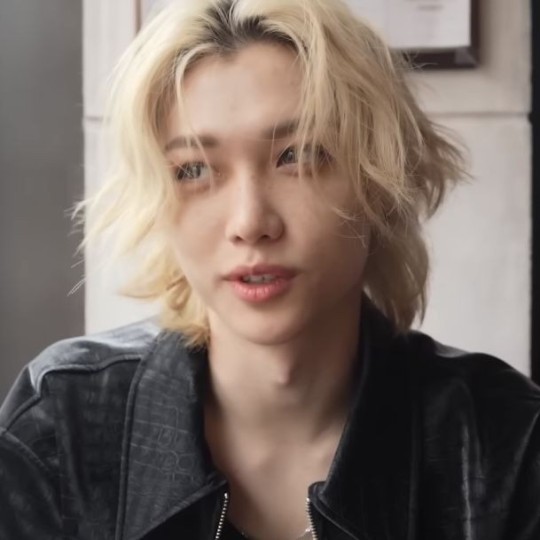
How would each member of Stray Kids handle you while you're on your period?
BANGCHAN | MINHO | CHANGBIN | HYUNJIN JISUNG | FELIX | SEUNGMIN | JEONGIN
WARNING: This is a female reader going through their period. If the topic of a period/anything that has to do with a period makes you uncomfortable, then don't read it. Just remember that there's nothing wrong with a woman's period. It's a perfectly healthy body function :)

THE MOODS It was very safe to say that you were an absolute wreck. Not necessarily because you were all over the place emotionally, but because you were just extremely sensitive. One tiny little compliment that Felix gave you would make you cry. One little critique would make you cry. The cute puppy that lived across the hall? It made you cry.
And so, Felix made an effort to always be with you. Any time you started crying, he'd instantly scoop you into his arms and coo to you, babying you with everything he had. While he was usually your baby, when you got emotional like this, you were his. And he'd do everything in his power to make you feel all better.
You want kisses? He's gonna douse you in them. You want to be held? Great! Felix won't let you go. You want him close? Felix will melt into you, nuzzle your cheek with his, and squeeze you until you feel better. You don't want any of that? Too bad. He'll do it anyway.
THE BLOOD You actually don't bleed that much. Your flow is really light, but it lasts a long, long time. And Felix couldn't be more thankful. Why? Because he could still get his cuddles while you bled and lay with you. What more, you were willing to go out and do things with him.
You didn't feel gross because you didn't have a swimming pool of blood in your pants, hell, you didn't have to double up on products, either. You could easily get away with just using panty liners most of the time. Simple as that. And Felix couldn't be more grateful that his girl was somewhat functional.
THE PAIN While your period was nice to you in the blood regard, it was NOT nice to you during the other symptoms that occurred. There wasn't necessarily pain, but you did tend to stay up way later. Why? Because you sweated like a mad man during the night. You'd get hot, then you'd get grumpy, and then you'd just want to sprawl and not be anywhere near Felix.
And while Felix was a bit upset by that, and wanted to cuddle like you both normally did, he also understood that you were just uncomfortable with sleeping in the same bed. He would be too if he was creating a new ocean made entirely of sweat where he was laying.
And so, he would go and sleep in the dorms at night, only to come right back the next day to be with you in case you needed anything.
THE PRODUCT Because Felix has two sisters, I feel like he'd be pretty comfortable with the sight of period products. He knew the ins and outs of it really well, and so he was more than happy to help out where he could. The one thing he was a bit hesitant on was going and getting the products for you.
It wasn't that he didn't want to because it was weird or embarrassing, no no no. He just really didn't want to slip up and get the wrong ones. Even if you were to write down exactly what you need and send a picture to him, he'd still be nervous that it wasn't the right ones, and that he failed you (even though he's incapable of failing anyone).
And when it comes to the waste, Felix just...doesn't want to look. He doesn't like the sight of blood in any shape or form, and so if he does accidentally see it, he'll just come to you and hesitantly ask you if next time, you could possibly cover the blood a bit more so he doesn't have to see it. And you do it, because he's too precious to argue with.

Hey! Firstly, thank you so much for reading this post, and I really hope you enjoyed! If you did, please like, reblog, or comment so I can see how I'm doing with writing and getting feedback! I hope you have a lovely day! Sleep well, stay in good health, and eat something if you haven't! ❤️❤️❤️
Taglist: @miss-daisy04 @kayleefriedchicken @wolfs-archive @stayyyyyyyyyyyy21 @wolfs-howling @rose-w-00-d @skzlover24
#stray kids#skz#stray kids imagine#skz imagines#skz stay#felix#lee felix#skz felix#stray kids felix#felix x reader#felix lee#yongbok#straykids#felix skz#stray kids lee felix#felix stray kids#lee yongbok#felix yongbok#stray kids yongbok#skz yongbok#yongbokie#skz lee felix#felix x you#felix x y/n#lee felix x reader#lee felix yongbok#lee felix stray kids#lee felix fluff
230 notes
·
View notes
Note
do i have to play undertale to play deltarune? i don't know anything baout undertale but i've your deltarune art and it's making me want to play
not necessarily! we don't entirely know how dr and ut connect right now but the prevailing theory is that it's sort of simultaneously a prequel and an alternate universe. you might miss out on certain easter eggs and you're definitely going to have a handicap in the fandom/theory space if you don't know much about undertale, but the actual story of deltarune stands basically completely on its own. the only major gameplay-related handicap you might have is related to certain aspects of combat--deltarune kind of assumes that you played through the tutorial battles that exist in undertale and therefore doesn't explain the basic tenants of the combat system, only the new elements it adds. most of the combat is still pretty intuitive, but you might want to look up what different colored bullets mean and how they behave as well as what different colored soul hearts can do. the game is still pretty good at teaching you as you go, though!
I would also caution you as someone who knows nothing/very little about undertale to be sure you're not expecting deltarune to function in the same way as a "normal" video game. Undertale sort of like. eases the the player in to its meta-ness and critique of the system in which it operates, whereas deltarune seems to assume that the player has already had that primer and therefore launches you straight into the more uncomfortable parts of its story in a way that is very deliberately jarring and disturbing. so be prepared for that! and be sure to read and pay attention to small details, they often come back later in big ways.
#tldr you should be fine to understand about 90% of dr without the context of ut!! just be prepared for some insane stuff to happen#BUT all that being said I replayed the entirety of undertale last night in like 3 hours. its really not a long game so it might be worth it#to try it out!!!#asks#OH AND ALSO. UTDR as a series basically assumes you're going to die multiple times on tougher battles. it's built into ut deliberately#so try not to get frustrated if it takes you a long time and multiple deaths to beat certain battles!!! thats how the game is supposed to g#& that's another thing you're sort of primed for in undertale. you should basically never give up no matter what
79 notes
·
View notes
Text
Matt Bowman says that the LDS Church is sometimes critiqued for its conformity, but he thinks there are different ways of understanding the faith, different emphases and different visions of what the church might be. And these will be seen at General Conference.
Matt doesn't think that these various visions of what the church might be are mutually exclusive, and he thinks the leaders he names as the most emblematic of each vision of what the church can be would say that actually they’d identify with two or three or all of the categories.
By thinking about the influence of these leaders and these different approaches, perhaps we also can get a glimpse of where the LDS Church might move in the future.
The Church of Effort
President Russell M. Nelson’s sermons consistently have emphasized effort, trying harder, doing better, “thinking celestial.” His most controversial sermon links divine blessings to human behavior and argues that the fulness of those blessings derives from doing what's right. It's an appeal to reach our divine potential through proper belief and right behavior. Of course, it also presumes that humans can, theoretically, always choose to do right.
The Church of Natural Law
The idea behind natural law is that God created a universe which functions through knowable principles that could be learned by scientific investigation as well as divine revelation. That investigation would reveal a natural order of things built into the fabric of the world itself. As humans learn that order, they can conform to it and be happy.
Dallin H. Oaks, first counselor in the church’s governing First Presidency, has a reputation as perhaps the most consistent defender of “The Family: A Proclamation to the World” among the current general authorities. That document is steeped in the language of natural law. It does not merely state that God prefers human families to function in a certain way; it argues that, in fact, the universe is set up such that families who function in that way will thrive while those who do not will struggle.
For Oaks, a lawyer by training, these sorts of arguments, with their if-then constructions, their neat definition of terms, and their rational procession, are irresistible. He speaks of principles and rules, the comprehensible structure of a universe that functions according to clear law.
“To understand the teachings and examples of our Savior, we must understand the nature of God’s love and the eternal purpose of his laws and commandments,” Oaks teaches. “One does not replace or diminish the other.”
The Church of Grace
The idea here is that divine grace is not something earned but rather a gift that can bridge the gaps of human frailty and heal human weakness. President Emily Belle Freeman, head of the global Young Women organization, is the Latter-day Saint leader most fluent in this dialect. Her career before becoming a church officer was built on interfaith dialogue with evangelicals, and her writing and teachings are drenched with evangelical idioms — not merely in content but also in style. She calls for a personal relationship with Christ that provides healing, advances spiritual power and comes in great abundance. She speaks the language of dramatic intensity characteristic of Protestant evangelicals but increasingly appealing to Latter-day Saints who turn to their faith for aid in overcoming challenges.
“In that place where you feel bound, plead for his grace. Trust that it is available in abundance,” Freeman teaches. “Jesus Christ sees you. He can help you overcome.”
The Church of Community
This is a vision of the church that emphasizes its communal aspects. To be a member is, in part, to take the sacramental bread and water on Sundays, but most of all to look after each other by contributing labor and resources to the well-being of the community, such as visiting people in the hospital or those who are lonely.
The titles of three of apostle Gerrit W. Gong’s recent conference addresses share a similar focus on the church as a community of mutual care. In April 2021, he spoke on ���Room in the Inn,” analogizing the church to the inns of the New Testament. There he asked members to “make [the Lord’s] inn a place of grace and space, where each can gather, with room for all.” In October 2023, he elaborated on the lyrics to the hymn “Love Is Spoken Here,” describing the ideal ward as a place where love is evident through service. That April, in a talk called “Ministering,” he stated “think of your ward or branch as a spiritual ecosystem.” For Gong, the church is a series of bound covenant relationships among humans as much as between humans and God. He emphasizes the social aspects of religious life, seeing salvation coming through bonds with one another.
119 notes
·
View notes
Text
Mutant Mayhem: A Critique on the Mutant Sub-Arc
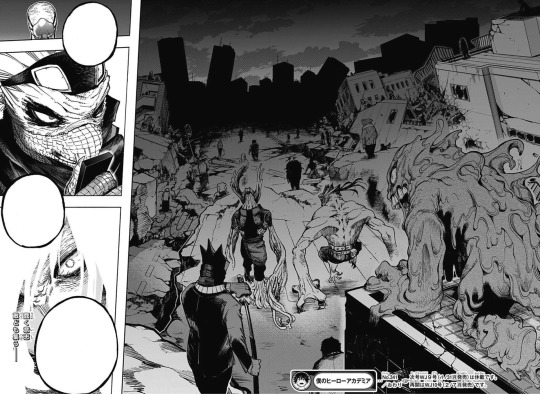
Normally, I start this off with some kind of intro to establish what I'm talking about, but I'm not going to lie: I think this might be the worst thing to come out of the main storyline. This may be a surprise to long-time followers of the blog. My dislike of Stars and Stripes and her arc has been well documented, with me calling it the worst part of MHA. As much as I dislike a lot of elements of the Stars and Stripes Arc, I can at least understand what Hori was going for, and it's pretty easy to ignore in the grand scheme of things. With this? I can't understand this.
So I want to put two disclaimers here. First off, I am not an expert on politics, sociology, or anything related to that in any way. I do not know how the events in the manga reflect real world issues, both in Japan specifically and the world at large. What I am is a writer. I am someone who analyzes stories for fun. This is going to be a critique of how the story handles the plot purely from a writing perspective. It will not be a critique of whether it is realistic or comparable to real world events. I'm sure there are other people far more equipped to handle talking about this.
Second off, for the sake of this, I'm ignoring a lot of the character work with Spinner. I actually think that's some strong stuff here. It just happens to be stuck in the middle of an arc that I don't feel uses that well. I know that isn't nearly as important as the first disclaimer, but I like it a lot and I want to give this arc flowers where I can. So, without further ado, let us get into this.
The Major Players
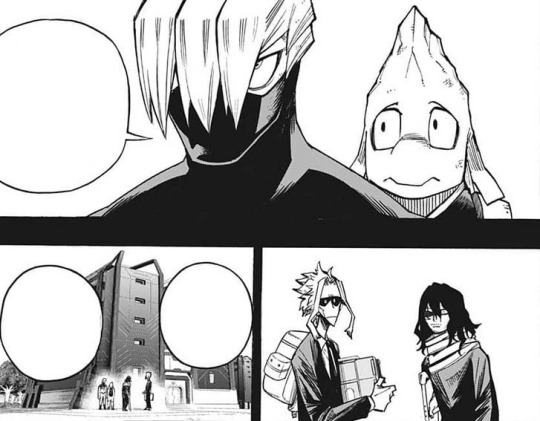
To be frank, Shoji and Koda feel out of place here. Do not get me wrong. I like them both, Shoji especially, but it does not feel like either of them has any place leading an arc. He's such a background character, even among the ranks of 1-A. And Koda is even worse in terms of relevance. Shoji and Koda don't have any real arcs of their own or connections to Spinner to make this feel warranted, let alone satisfying. At least, not that'd tie them into this part of the story. Koda is a kid who was shy that wanted to find his voice and gain more confidence. Shoji, the leading man of this whole arc has... nothing. He was just a quiet, minimalist who helped out where he could.
On the other end of things, there is Spinner. For the whole of this arc, Spinner is reduced a brainly functional monster. Yeah, that's great for his character, but it hurts the rest of the arc and the point it is trying to make. Because the guy who is supposed to be leading this part of the story has been reduced to a drooling moron who can barely string a sentence together. When he does talk, all he can say is that he doesn't even care what his own allies are doing. It makes it come across that Spinner doesn't have any real place in his own arc. It ends up hurting the manga and the story it is trying to tell by actively robbing the key player of his agency.
And then we have the spider guy. I'm not even going to bother remembering his name. We don't know anything about him or why he's doing this. He's only really here to spout out exposition about the discrimination of the Mutants and what they have gone through. So do we get someone who is passionate about fighting for this cause? No, not really. He makes it clear to the audience that this is not his main goal. All he is there to do to keep the revolution going for the sake of All For One. He's not the kind of figurehead that this arc needs. Someone who can act as the passionate mouthpiece to really push what the Mutants want and need. He just ends up being some other stooge that quickly gets defeated without much thought.
So right off the bat, it doesn't feel like these characters have any strong ties or arcs to work with here. It feels like we're dealing with the leftovers. Like all the other characters were busy somewhere else, but needed something Spinner for his story and to get Kurogiri. Shoji and Koda are the only ones left with any kind of panel time, and now he had to throw some stuff together about how there was all this prejudice against Mutants. Because that is all you have to tie them all them together. Okay, sure, maybe the characters aren't really that good for this kind of story line. But maybe the actual writing and build up to make this part of the story will make this arc feel satisfying, right?
The Setup?
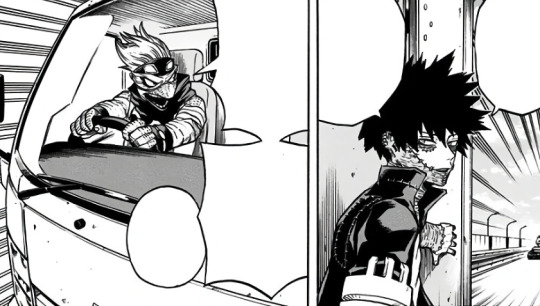
Right off the bat, I don't think that this plot line is that well established. Looking back at the series, what examples do we have of Mutant discrimination within the main manga? Maybe a few small moments. A comment about how big the doors are at UA as opposed to other places. Which can imply that other buildings aren't as accommodating for those, but it's never really explored that much beyond that one comment. Gang Orca is a Mutant and is said to be one of the most villainous-looking heroes. Yet I feel like that's a pretty forgettable fact about how minor of a character he is and how aggressive he tends to act around people. If anything, that feels like a bigger contributor to why people see him as a villain.
A few insults based on how a character looks. Namely, Shoto to the dog Chief of Police, Dabi to Spinner during the car chase to get Overhaul, and Pony to Shoji during the Joint Training Arc. However, none of these are given real focus. They are all either played off like any other insult or even a joke, in the case of Dabi and Spinner. Do you see what I'm getting at? For all the focus it gets as an end-game issue, there really isn't a lot of focus put on it with the story or characters. It's all a bunch of smaller moments. Smaller moments that are few and far between and aren't given any kind of real gravity for when they do happen. There isn't anything that stands out to me that makes me think that Mutants are facing any kind of discrimination in the modern day.
And before any of you say anything, yes, there are more notable examples of problems like this in the Vigilantes spin-off. The most obvious one is Kirihito Kamachi. He has the body of a giant praying mantis. He has difficulty living and interacting with others because of how monstrous he is, such as finding a place that can accommodate him. That is a great exmaple... that is not in the main manga. As good as Vigilantes is, it's still ultimately supplementary material. To me, you shouldn't have to rely on supplementary material to support your main story. Because most people aren't going to be reading it. At least, not many people do from what I have seen. Within the main manga, there are only two major examples I can think of.
The first is the Creature Rejection Clan. A group of people solely dedicated to the exclusion of Mutants on the basis of blood purity. Which certainly sounds bad. The story says they used to be a thing back when the first Quirks came about. Yet they are barely even an organization in the modern times. They are treated instead as a long-dead relic, who are so weak and fractured as to be a joke. The second is the attack on the giant fox woman, which has so many extraneous factors involved that I hesitate to count it. Such as the fact it was done by a bunch of people without any kind of real racial motivation behind it and it was a random attack by scared people during a total societal collapse. So while it was part of the world, it seemed more in the background. Something that happened before with some lingering wounds. A problem with the world that should be dealt with, but not something that is that prevalent.
The Mutant's Madness
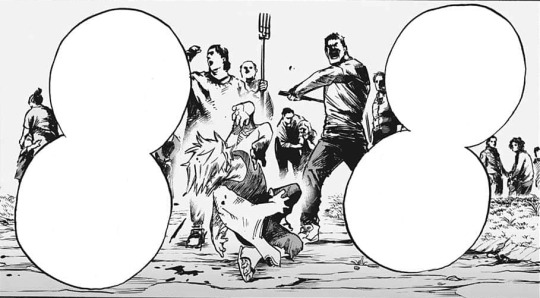
We then cut to the current storyline and... we have a horde of thousands upon thousands of Mutants all marching on the hospital with Kurogiri inside of it. All of these Mutants were so disgruntled about the world as is, that they formed a mob of this size. We're told that Spinner was regularly attacked and sprayed with bug spray. We get mentions of these massive hate crimes against Mutants that were never mentioned before. We then get flashbacks to Shoji's history. About how he was beaten and heavily scarred by people that attacked him as child. This is something that happened whenever he interacted with any other people. Hori: Where on Earth did any of this come from?
I want you to think about all the examples I picked out. I did not intentionally cherry-pick those. I tried my best to find all the notable examples of this before the arc. Would any of you assume that would be how Mutants were treated in the setting? I certainly wouldn't. I don't think I'd ever reach the conclusion that the story did. That, not even ten years ago, there were mass killings and public attacks on small children. This took such a drastic turn that I get whiplash just thinking about it. Was this ever implied or set up before? I feel like this kind of violence would have been shown or mentioned until now, but no. This is the first time we've heard about it on this scale.
And introducing a problem this big this late into the story, in the very arc it is relevant in, is sloppy writing to say the least. Realistically, this should be something that affects a large portion of the world and even members of our cast. You would think that if stuff like that was happening, we'd see way more examples of this in the story. Characters like Tokoyami, Sero, Tsuyu, and Mina. All of which could have been used to explore this more, but they have never been mentioned. Could you imagine if we only got passing mentions of what was going on with Himiko? And, outside of her obsession with blood, we never fully understood why she was that way. Only to find out there are thousands of other kids that go through exactly what she did and no one ever talked about it?
And why is that? Why is it never seen or mentioned? Hori tells us it's because the cities aren't as bad. It's out in the country where it's really bad. What?! What kind of explanation is that? Let's ignore the fact that it doesn't make any sense. If you have that kind of acceptable violence even out in the sticks, there would have to be some kind of sign of it in the major cities. The fact of the matter is that this is such a lazy excuse. Geez, Hori, if that was the case, maybe you should have shown us something outside the city then. Maybe then you could have built up this plot point more if you wanted it to be such a major focus of the arc. Why even go to this level of extreme with it? Especially since this level of violence the Mutants undergo suffocates the message so much.
The Mangled Message

My issue with the violence is that it is crippling the narrative the story wants to go for. Having it be this level of violence justifies the Mutants in their revolt. Shoji's whole point is not letting your hatred win and how you need to rise above what people think of you. A good sentiment on paper. If you want to talk about the kind of harm extremists can do to a message and progress as a whole, that is totally fine. Or maybe you could go with how people can be caught up in something that doesn't have their real interests at heart. There are a lot of ways you could go about this kind of message.
But that kind of talk doesn't exactly fly when your lives and wellbeing are in active danger. The Mutants aren't getting side-eyed by some old dude on a porch. They're running from hate mobs out for blood. Hate mobs are so wild and vindictive they will openly attack children on sight with zero moral compunctions about them. Which, yes, is the extreme, but the rest of what we learn doesn't make it seem like it's that far of an extreme. This kind of writing not only makes it jarring with what we have been shown, but it puts the Mutants as a whole in such a terrible position in this world. I can't exactly blame them for fighting back, even if it's aimed in the wrong direction.
When I'm writing this, I keep thinking back to that one line from Shoji. "Spinner, you're about to put us back thirty years." I get what the story is trying to say with that, but it feels so wrong here. Sure Shoji, you can try and be the model citizen that wants to bridge the gap between people. Not stooping to their level and all that. Yet trying to moralize people who feel actively threatened by the world at large doesn't come across the way you think it does. It comes across as tone-deaf and preachy even in the best light. And that's not the kind of thing you want to say about the guy who is supposed to be in the right. It's this weird moralizing that makes this sub-arc so hard to read and enjoy.
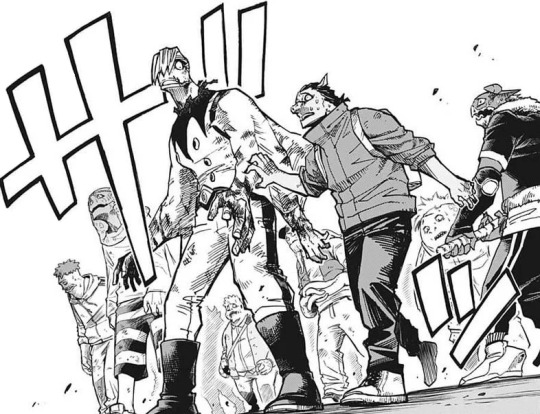
What makes it worse is that the crowd feels like such a mindless mob. One that only stopped because they realized they were attacking a hospital. What on Earth did you think you were doing here? Volunteer work? I get that the point is that Shoji's speech and the heroics of everyday people is what stopped them, but come on. It feels like Hori needed to put them in a much worse position morally to make the violence stop. That doesn't really acknowledge the problems that they are going through in a reasonable way. Why not make them stop because they feel like their leader is nothing more than a violent thug? Or the revelation that they are fighting for just to be used by All For One? Not because he cares about them, but because he just wants to build chaos?
This entire issue just feels so bizarre and poorly thought out on so many fronts. It makes me wonder why we're even getting this kind of arc in the first place. On the surface, it fits in with the other villains. Which I get is the point of the villains. They are people with genuine grievances towards society, but go too far with what they will do to get what they want. But at least it felt like the villains were exceptional extremes of the system who were hurting more than they helped. Their issues were a product of the system, but were far more personal. This seems like it's something far more widespread. Something so ingrained in the world that goes beyond any one person. So it feels at odds with how the rest of the villains and issues are set up.
And to be clear: I'm not saying this because I don't think MHA should cover these topics. In a series talking about the issues of society and how people need to work together to make things better, bigotry in any fashion could be something you could easily cover. If anything, I think that MHA Is uniquely suited to talk about this. It's certainly more appropriate to cover it here than other series that try to use its supernatural elements to talk about bigotry. And yes, that includes the X-Men. But to talk about these issues, you need to lay the groundwork. You need to tackle it with some tact. You need to know what you are doing. And Hori clearly doesn't know what he's doing here.
The Rewrite
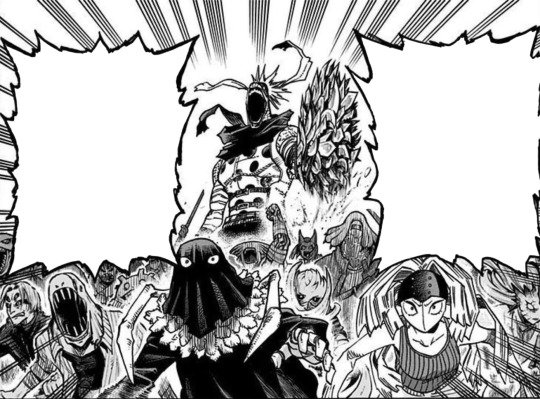
Now, how would I fix this? This is kind of an awkward position for me to be in. Because I don't think you can fix this arc in and of itself. It's built around a foundation that is shaky at best. I honestly think you'd need a whole other mini-arc just to set this issue up and establish this as an issue for Shoji. At very least, you'd have to put a lot more of a focus on Spinner as a real character. So I think that the best answer is to just rewrite it from scratch.
For starters, you change the people that are attacking the hospital. The horde is not all Mutants. They are instead all followers of the League itself. They are just like Spinner was back when he was following the image of Stain. They are people who think they understand what the League is fighting for or are merely fighting back for their own personal vendettas. They are all people who felt small and hurt. It is effectively an army of Spinners. At least, as he was early on in the manga. And these aren't anywhere near as bad as they are in canon. It can be for whatever ill-thought-out reason there is. Spinner is still leading the charge, still full of Quirks. And while his change in form would tie into his other story, I'm going to try and make it relevant to the rest of the arc.
And you may be wondering how this ties back to Shoji? It doesn't. Again, I like Shoji, but he does not need to play such as a major part of the final arc focused on him. So I suggest we get another student to replace him. Specifically, Iida. Why put Iida here? To be perfectly frank, I think Iida was wasted in this arc. He doesn't have any real ending for the arc we've seen and doesn't add much to the part of the story he is in. All he's used for is a glorified taxi for Shoto to get to his arc. I do have an idea about him and why I am putting him here, but I'd be lying if I said my personal feelings on Iida this arc aren't part of my decisions.
To start things off, I would make it clear that this is one of the last functional hospitals in the country. This place is integral to treating the most seriously injured and sick. Trying to move any of the patients would likely kill them, including Kurogiri. The heroes wouldn't want to use it as a battleground, but feel forced to because such a valuable target is there with Kurogiri. So the heroes organize a force to help defend the hospital, for which Iida volunteers. And when asked about it, Iida says he wants to protect it because it's about his brother. Both that is what Tensei would do and all he can think about is his brother laying in that same hospital.
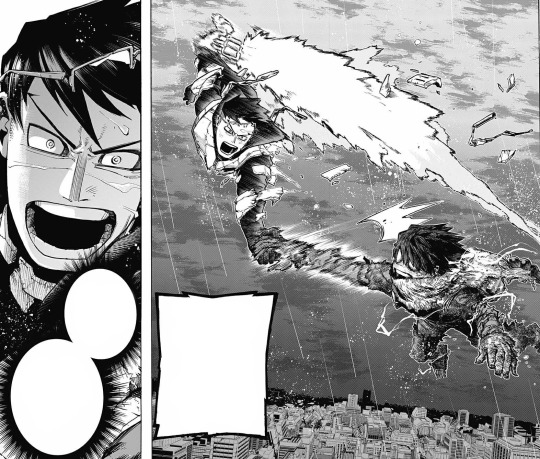
And this is where their dynamic would come in. Spinner and Iida are comparable in how they both looked up to a person in their life and how much that warped their perspective. After encountering Stain, both of them changed. Iida strived more to emulate and honor his brother rather than idolize him. He wanted to be the one to build up the rest of his classmates and become a proper hero that can save people. Spinner went from being a fanboy to an idol himself, but a false one. He got the power he wanted, but an empty in the process, with everyone else ascribing things to his actions rather than having any real will of his own.
I'm doing this because, in a series all about inherited wills and legacy, I think that you could do something focusing on inheriting the wrong ideas from someone. That is brought up a few times throughout the series, but I think that some part of the finale could focus on it. It's how your actions have meaning and those actions can spread out to people who look up to you and trust you. These are the roles that Iida and Spinner fulfill. It ties back to what the Mutant Sub-Arc was trying to bring up about how this group of people is being used and radicalized for All For One's cause and not their own, but in a way that doesn't tie it to all the baggage of discrimination and bigotry.
Iida can talk about how the crowd is misguided. That the League and All For One aren't on their side. Nobody in the crowd cares though. They rather shout about their grievances. About why they are fighting this war in the first place. They all look up to Stain and Spinner as their revolutionaries. They all turned to Spinner looking for his wise words. This is the part where he says he doesn't care. He can give a similar speech as he did in canon, but it can be more to emphasize his own past as opposed to Iida. How Iida is where he is, because he was born lucky with a wealthy family and a strong Quirk. I think that this would be a lot more personal to Spinner. His whole perspective and life has changed so much that Stain, the man that inspired him, is barely even an afterthought.
This would be encouraged by a man on a roof seeing it all: Trumpet. Now, I am replacing the spider guy with Trumpet for a few reasons. One is that he's already an established character, and he already has ties to Spinner. Second is that his power of "Incite" could do a lot to explain how the crowd is fighting so well. Finally, I think that it could reflect how All For One is using these people. They aren't here to lead a revolution, but to cause chaos. And I think that works better with a figure like Trumpet. The second a new regime seems to be rolling in, he immediately switches sides to working with All For One. He isn't as staunch MLA follower as people thought he was and merely attached himself to it because it was a means of power. It feels more fitting for someone like him to talk about how he doesn't really believe in this kind of stuff than someone who should be affected by the issue they are fighting for.
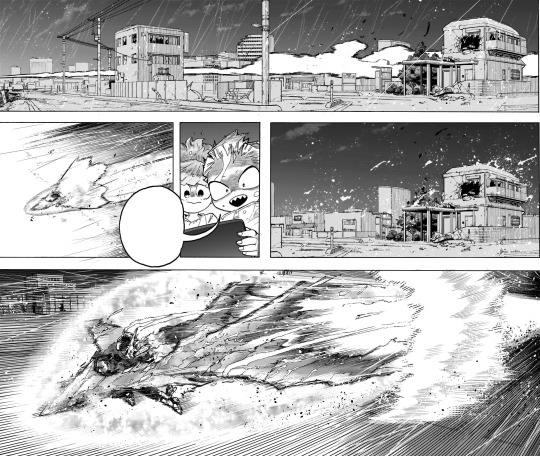
So the battle rages on between the two groups. You could also throw in some of the students to help fight with Iida. To me, you could put any of the other students here if you want. Maybe you could have some moment for Jiro or Koda here. They'd be able to use the power of their Quirks to help drown out Trumpet and all of his rhetoric. Maybe you could have people like Sero and Ojiro work as the counterpoint. They don't have great Quirks, but they were still able to make it into the Heroics Course in spite of that fact. Their roles don't matter as much to me as the main conflict between Spinner and Iida. Iida tries to fight back as hard as he can, but, ironically, Spinner's ability to jump and climb between walls makes it hard for Iida to attack him.
That is when the crowd starts closing. The doctors are doing their stand to make sure no one can get in and hurt the patients. This makes the crowd hesitate some. At that moment, Iida gets an order. To stop the crowd no matter what it takes and save the doctors. Even if it means he has to kill Spinner. Everyone thinks that Iida is going to violently charge at and destroy the crowd. But no. Iida doesn't do that. Instead, he uses his immense speed to rescue everyone in the hospital. He is going at such high speeds that he is able to save everyone before they can die and move them to another location away from the fighting. All except Kurogiri, who is under such heavy defense that Iida could not reach him. Everyone is shocked and amazed at this, including Iida, who never thought he'd be able to pull off such a move.
After it's all done, Iida is spent. He used Recipro Burst too much and is now unable to move. Yet he still stands, begging the crowd to not attack the hospital. This is where Iida's arc ends. He gets to be a true hero, focusing on saving others rather than trying to hurt them, and making another speech to stop a raging crowd. The doctors can be out there as well, as I do think that bit is important to the greater themes of the series. And it does work for a moment. Spinner does not care though. He still moves forward. And then suddenly stops in his tracks. Only to reveal Stain had used "Bloodcurdle" on him, leaping from on high to stop the assault on the hospital.
Yeah, I'm throwing Stain in here too. I've always disliked how Stain's death was handled. I don't mind him dying, just how it was done. Not only did it feel totally pointless, barely adding anything to the final fight with All For One, it felt so inconclusive to his character. There's more that could be done. We have already got the conclusion to All Might and Stain's connections at the statue, so having him die with Toshonori doesn't really fit. To me, Iida and Spinner have some of the strongest connections to Stain. Because they were the ones who were most changed by interacting with him and his legacy as a villain. So I believe that adding him here will add more to the arc and his own character.
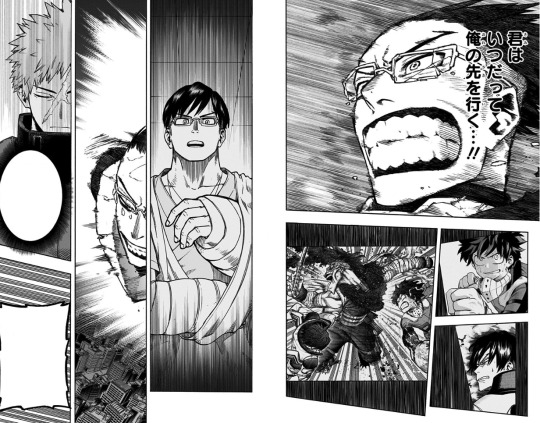
This is a point where Stain takes Spinner to task about everything he's done so far. About how this was not his dream and not his goal. That was to flush out all the fake heroes. Not to hurt people who "didn't deserve it". By killing Iida and attacking his hospital, they are all corrupting his mission. This really puts a stop to the crowd. This is their idol, the one who started their revolution. And now he's talking about how their work makes them sick. So now he stands against them. To protect Iida and the hospital. You could even call back to his infamous speech, a dreadful aura falling over the whole Quirk. Yet Spinner starts to move again much sooner, either from losing so much blood from "Scalemail" or having a Type-O blood type, and the Quirk stops affecting him.
He charges up to Iida, ready to cleave him in half. Only for Stain to block the attack to save Iida, dying in the process as his body gets stuck on Spinner's weapon. Only to be tossed aside without a care as Spinner makes his way to the hospital. In this way, it acknowledges the growth of Iida into a "true hero" in the eyes of Stain. It's between these three elements that the crowd stops. The heroic moment of Iida, the death of Stain, and the obvious indifference of Spinner are all what led to them realizing that this cause may not be worth fighting for and stopping the charge. I think that would be a lot more point of a moment. Because now we get the culmination of Iida's character, the ironic death of a major villain, and the final tragic note of Spinner as a character.
And I think having it be this way could make it more fitting for where the two end up. We see Iida start to work closely with Uraraka when helping out the children. Maybe Iida could be working with other kids that are in trouble. He can be the guy who is trying to help out his community and lead like example. Just like what his brother was doing before him. Meanwhile, it could help recontextualize Spinner's ending. I've already talked about this in my rewrite of the ending before, but I think this could add a nice way to present Spinner's book. That he wants to tell the truth of the League and have them be remembered, but not in a way that will radicalize people like him in the future.
Now, is this a deviation from the main story and what this sub-arc was going for? Yeah, but I don't think that you are losing much by changing the players and context. Here, you can still have the misguided rioters that have close ties to Spinner, but without a lot of the sloppy writing surrounding the Mutant storyline. It also can give more meat to two major characters that felt shafted by the final storyline. Iida get's recognized as a true hero, finally living up goal he had since he fought Stain. Stain himself dies an ironic, but fitting death. He dies at the hands of a follower who idolized him, but did so saving a kid he said was a false hero. Overall, I believe this does more justice to the characters and the story.
#My Hero Academia#Not Quirks#Shuichi Iguchi#Spinner#Tenya IIda#Akaguro Chizome#Stain#Mezo Shoji#Koda Koji#MHA Meta#MHA Theory
56 notes
·
View notes
Text
Disability Tropes: The Miracle Cure
The miracle cure is a trope with a pretty negative reputation in disability circles, especially online. It describes a scenario in which, a disabled character, through either magic, advanced technology, divine intervention or some combination of the three, has their disability cured throughout the course of the story. Sometimes this is literally, as in the disability is completely and entirely cured with no strings attached. Other times, it looks like giving an amputee character a prosthetic so advanced that it's basically the same as "the real thing" and that they never take off or have any issue with, or giving the character with a spinal injury an implant that bypasses the physical spine's break, or connects to an exoskeleton that allows them to walk again. Sometimes, it can even look like giving a character some kind of magic item or power that negates the effects of the disability, like what I talked about in my post about "the super-crip" trope. Either way though, the effect is the same: The disability is functionally cured and is no longer an "issue" the author or character has to worry about.
But why would this be a bad thing? In a world with magic or super-advanced tech, if you can cure a character's disability, why wouldn't you?

[ID: a screenshot of Roy mustang from Full metal alchemist Brotherhood, a white man with short black hair in a hospital gown. In the corner of the screen is the hand of another person holding a small red gemstone. /End ID]
Well there's a few reasons. First, lets talk about the purely writing related ones. If you've been around the writing or even media critique communities for a bit, you've likely heard people voicing their frustrations with tropes like "The fake-out death" where a character is either implied to have died, but comes back later, or is explicitly shown to be dead and then resurrected. Often when this happens in media, it leaves the audience feeling cheated and like a character's actions and choices don't really matter if even the worst mistakes and consequences can be undone. In the case of the latter situation, where they die and are brought back, it can make the stakes of the whole story feel a lot lower, since even something like death is shown to be reversible, so the audience doesn't really have to worry about anything bad happening to their favourite character, and once you've used this trope one time, people will constantly wonder why you wouldn't use it every time it comes up.
The same is true for "fixing" a character's disability. It sets a precedent that even things as big and life-changing as disability aren't permanent in this setting. We don't have to worry about anything major happening to the characters, there's no risks associated with their actions if it can all be undone, and it will lower the stakes of the story for your audience. Personally, I also feel like it's often used as a cop-out. Like writers wanted to include a major injury the leads to something big like disability for shock value, but weren't sure how to actually deal with it afterwards, so they just made it go away. Even in cases where the character start the story with a disability and are cured, this can still cause issues with your story's stakes, because again, once we've seen you do it once, we know its possible, so we won't feel the need to worry about anything being permanent.
Ok, so that's the purely writing related reasons, but what if that situation doesn't apply to the story you're writing? What if they're "fixed" right at the end, or the way they're cured is really rare, so it can't be used multiple times?
I'm glad you asked, because no, this is far from the only reason to avoid the trope! In my opinion, the more important reason to avoid it is because of how the a lot of the disabled community feels about the miracle cure trope, and the ideas about disability it can perpetuate if you're not very, very careful.
You might have noticed that throughout this post, I've put words like "cured" and "fixed" in quotes, and that's because not every disabled person wants a cure or feels like their ideal to strive for is able-bodied and neurotypical. For many of us, we have come to see our disabilities as part of us, as part of our identities and our sense of self, the same way I, as a queer person might see my queerness as a part of my identity. This is an especially common view among people who were born with their disability or who had them from a young age, since this is all they've ever really known, or who's disability impacts the way they think, perceive and process the world around them, how they communicate with people or in communities who have a long history of forced conformity and erasure such as the autism and deaf communities. Many disabilities have such massive impacts on our lives that we literally wouldn't be who we are today if they were taken away. So often though, when non-disabled people write disabled characters, they assume we'd all take a "cure" in a heart-beat. They assumed we all desire to be just like them again, and this simply isn't the case. Some people absolutely would, and there's nothing wrong with that, but it's not as universal as media representation makes it out to be.
Another reason it's so heavily disliked is because this trope is often used in conjunction with other ableist and harmful tropes or it's used in ways that perpetuate misinformation about living with a disability and it can have ableist implications, even if that's not what the author necessarily intended.
If the miracle cure is used right at the end of the story for example, as a way to give characters a happy ending it can imply that the only way for a disabled character to be happy in the long run, is for them to be "fixed", especially if they were miserable all the way up until that point. If it's used earlier in the story as a way to get said character back into the action, it can also be read as the author thinking that disabled people can't be of use to the plot, and so the only way to keep them around is to "fix" them.
Of course, there's also the fact that some authors and writers will also play up how bad being disabled is in order to show why a cure is justified, playing into the "sad disabled person" trope in the process, which is pretty much what it says on the tin. Don't get me wrong, this isn't to say that being disabled is all easy-breezy, there are never any hard days and you should never show your character struggling, not at all, the "sad disabled person" trope has it's place (even if I personally am not a fan on it), but when both the "sad disabled person" trope and the miracle cure trope are used together, it's not a great look.
This is especially bad when the very thing that cures the disability, or perhaps the quest the heroes need to go on to get it, is shown to be harmful to others or the disabled person themselves. Portraying living with a disability as something so bad that it justifies hurting others, putting others at risk, loosing yourself or killing yourself in order to achieve this cure perpetuates the already harmful idea that disability is a fate worse than death, and anything is justified to avoid it.
I've also noticed the reasons the authors and writers give for wanting to cure their characters are very frequently based on stereotypes, a lack of research in to the actual limits of a person's disability and a lack of understanding. One story I recall reading years ago made sure to tell you how miserable it's main character, a former cyclist, was because he'd been in a car accident where he'd lost his arm, and now couldn't ride bikes anymore, seemingly unaware of the fact arm amputees can, in fact, ride bikes. There are several whole sports centred around it, and even entire companies dedicated to making prosthetic hands specifically for riding bikes. but no, the only way for this to resolve and for him to be happy was to give him his arm back as a magical Christmas miracle! It would be one thing if the story had acknowledged that he'd tried cycling again but just had difficulties with it, or something was stopping him from being able to do it like not being able to wear the required prosthetic or something, but it really did seem as though the author was entirely unaware it was even possible, which is an issue when it's the whole point of your story existing. This happens a lot more often than you'd think, and it's very clear when an author hasn't even bothered to google search if their character would be able to do something before deciding the only solution is to take the disability away.
There's also the frustration that comes from being part of an underrepresented minority, finally seeing a character like you on screen or in a book, only for that representation to be taken away. Disabled people make up roughly 16% of the population (though many estimate these numbers are actually much higher), but only about 2.8% of American TV shows and 4.1% of Australian TV shows feature explicitly disabled characters. In 2019, around 2.3% of films featured disabled characters in a speaking roll, and while it's slowly getting better as time goes on, progress on that front is very slow, which is why its so frustrating when we do see characters like ourselves and so much of their stories focus on wishing to be, trying to become or actually being "cured".
An finally, there's the fact this is just a really common trope. Even if we ignore the issues it can cause with your story's tone and stakes, the harm it can do to the community when not handled with care, the negative perceptions it can perpetuate and everything else. It's just a plain-old overdone trope. It shows up so often that I, and a lot of disabled people, are just getting tired of seeing it. Despite everything I've said, there are valid reasons for people to not want to be disabled, and just like how I made sure to emphasise that not everyone wants a cure, it's important to recognise that not everyone would refuse it either. So long as it's not done in a way that implies it's universal, in theory, depicting someone who would want and accept a cure is totally fine. The issue is though that this trope is so common and so overdone that it's starting to feel like it's all we ever see, especially in genres like sci-fi and fantasy (and also Christmas movies for some reason).
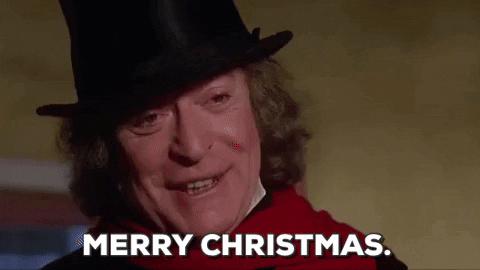
[ID: A Gif of a white man in a top hat nodding his head with the caption "Merry Christmas" down the bottom. /end ID]
Personally, because it's so common, I find even the few examples of the trope used well frustrating, and I honestly feel that it's at the point where it should be avoided entirely where possible.
Ok but Cy, you mentioned there are ways to use this trope well, what are they?
So, like I said, I'm of the opinion that this trope is better off not being in your work at all, but if, for whatever reason, you can't avoid it, or it's use is really that important to the story you want to tell, there are less harmful ways to implement it.
Don't have your only disabled character take the cure
If you really must cure your disabled character's disability, don't make them the only disabled person in the story. Show us another character who, when offered the same cure, chooses not to take it. This at least helps push back a little against the assumption of "of course everyone would want this" that these kinds of stories often imply and doesn't contribute (as much) to disability erasure in the media.
Don't make it a total cure
In real life, there are cures for some disabilities, but they rarely leave no trace. For example, an amputee's limb can sometimes be reattached if it was severed and they received medical treatment fast enough, but it usually results in at least a little nerve damage and difficulties with muscle strength, blood flow or co-ordination in that limb. Often times, these "cures" will fix one issue, but create another. You might not be an amputee anymore, but you're still disabled, just in a different way. You can reflect this in your fictional cures to avoid it feeling like you just wanted to avoid doing the work to write good disabled representation.
Do something interesting with it
I got a comment on my old tumblr or possibly Tik Tok account ages ago talking about their planned use for the miracle cure trope, where their character accepts the cure at the cost of the things that made her life enjoyable post-disability. Prior to accepting the cure, she had found other ways to be independent to some extent and her community and friends helped her bridge the gaps, but they were all taken from her when she was "cured" forcing her into isolation. Kind of like a "be careful what you wish for" sort of thing. The story was meant to be a critique on how society ignores alternative ways of getting the same result and how conforming to other people's ideas of "normal" isn't always what you need to bring you happiness. This was a genuinely interesting way to use the trope I think, and it's a perfect example of taking this trope and twisting it to make an interesting point. If you must use a trope like this, at least use it to say something other than "disability makes me sad so I don't want to think about it too much". Alternatively, on a less serious note, I'm also not entirely opposed to the miracle cure being used for comedy if it fits the tone. The Orville has some issues with it's use of the Miracle Cure trope, but I'd be lying if I said Isaac amputating Gordan's leg as a prank, knowing it could be reversed in a few hours did get a chuckle out of me.
If your villain's motivation is finding a cure for themselves, don't use it as justification for hurting people
Disabled villains need a post all their own honestly, but when a villain's motivation for doing all the terrible things they do is so they don't have to be disabled anymore, it's especially frustrating. Doubly so if the writer's are implying that they're justified in their actions, or at least that their actions are understandable because "who would want to live like that?" Honestly, as a general rule of thumb, avoid making your villains disabled if you aren't disabled yourself (especially if they're your only disabled character), but if they are disabled, don't use the disability as a justification for them hurting people while finding a cure.
So are there any examples currently out there to look at where the trope is used, if not well, at least tolerably?
Yeah, I'd say so, but they're few and far between. Two examples come to mind for me though.
The Dragon Prince:

[ID: A Gif of Ava the Wolf from the Dragon Prince, a light brown, fluffy wolf who is missing her front right leg. /End ID]
The Dragon Prince on Netflix uses the miracle cure twice, but I still really enjoyed the show (at least I did, up until my Netflix subscription ran out, so I've only seen up to season 4). The first time the trope is used in the series, it's actually a fake-out. Two of the main characters, while looking for someone to help them heal the dragon egg they're carrying, encounter a young girl named Ellis and her pet wolf Ava. The two explain their egg is not looking good and they need to find someone to help it, but no one they've found had the knowledge or ability to do anything to help. Ellis says she knows a healer who can help them, and tells them that this healer even restored Ava's amputated leg when she was a pup. When we actually reach this "miracle healer" however, she is revealed to be simply an illusionist. She explains that Ava is still missing her leg, she simply made it look as though she had restored it because Ellis's parents were planning to throw the puppy out, believing it would not survive with its disability and would only be a drain on supplies. This was not actually true and Ava adapted to her amputation very well, she simply needed more time, and hiding her disability and making her appear abled gave her the time she needed to fully recover and adjust. When they return to the healer with the main characters, she removes the illusion and explains why she did it, emphasising that the real problem was never with Ava, but with how people made assumptions about her.
While I do feel it was drawn out a bit too long, I do appreciate the use of the trope as the set up to an overall positive twist. Disability does come with down-sides, it's part of the deal and it would have been nice to see a bit more of that, but for disabilities like amputation in particular, the worst of our problems often come from a lack of adequate support and people's pre-conceived ideas about us, and it was nice to see this reflected, even if it is a little overly simplified.
The second time this trope comes up in the series is when one of the antagonists, Soren, is injured during a fight with a dragon, becoming paralysed from the neck down. His sister, Claudia is absolutely beside herself, believing it was her fault this even happened in the first place, but Soren actually takes his new disability very, very well, explaining that he understands there are things he can't do now, but that there's a lot of things he can still try, that his previous job as a soldier just didn't allow time for. It's possible this reaction was him being in denial but it came across to me as genuine acceptance. He is adamant that he doesn't want a cure right from the beginning because he knows that a cure would come at a cost that he doesn't want his sister to pay, and that he is content and happy with this new direction his life will be going in. Claudia, however, is not content. It had been shown that she was already using dark magic, but this event is what starts her down the path of using it in earnest, disregarding the harm it will cause to those around her. She ignores Soren's wishes, kills several animals in order to fuel the healing spell that will "fix" him, and Soren is pretty clearly shown to be horrified by her actions. What I like about this use of the miracle cure trope is that it touches on something I've seen happen a lot to disabled people in real-life, but that rarely shows up in media - the fact that just because we accept ourselves, our disabilities and our new limits, doesn't mean our friends and family will, unfortunately. In my own life, my mum and dad were always accepting of my disability when I was younger, but as I got older and my support needs changed, my body took longer to heal and I stopped being able to do a lot of things I could when I was little, they had a very hard time coming to terms with it and accepting it. I'm not alone in this either, a lot of disabled people end up cutting contact with friends and family members who refuse to accept the reality of our situations and insist "if we just try harder maybe we won't be so disabled" or "Maybe you will get better if you just do [xyz]". Unfortunately however, some disable people's wishes are ignored completely, like Soren's were. You see this a lot in autistic children who's parents are so desperate to find a cure that they hurt their kids through toxic and dangerous "treatments" or by putting them through abusive therapies that do more harm than good. Claudia has good intentions, but her complete disregard for Soren's decision still harm them both in the long run, leading to the deterioration of their relationship and causing her to spiral down a very dark path.
Full Metal Alchemist: Brotherhood

[ID: A Gif of Ed from full metal alchemist, a white boy with blond hair, staring angrily at a jar of milk on the table. His brother Al, a sentiant suit of armour, is in the background looking directly at the camera. The caption, spoken by Ed, says "So we meet again you little bastard" /end ID.]
The show does begin with Ed and Al looking for a way to cure their disabilities (which they gave themselves when trying to resurrect their mother as children went horribly wrong). However, when the boys discover that the object needed to do that - a philosopher's stone, can only by made through absolutely abhorrent and despicable means, and using one, likewise, comes at the cost of potentially hundreds or thousands of people's souls, they immediately stop, and shift their focus on finding the stones that had already been made so it can't fall into the wrong hands, and preventing the creation of new ones. The core theme of the show is that everything has a cost, and sometimes the cost is simply too great.
However, right at the end of the show, several characters are healed in a variety of ways. Ed gives up his ability to do alchemy to get his brother's body back, as well as his arm so he can save his friends in the final battle, but neither of the boys come away from this completely "healed". Al's body has not been used since he was a child, and so it is shown he has experienced severe muscular atrophy that will take a long time and a lot of work to recover from, acknowledging that he has a pretty tough road ahead of him. When we see him in the epilogue, he is still on crutches despite this being several months after getting his body back. Likewise Ed is not fully healed, and is still missing one of his legs even if he got his arm back.
The more... interesting use of the trope, however, is in the form of Colonel Mustang who was blinded in the final season. Mustang is shown to take to his blindness pretty well given the circumstances, finding a variety of ways to continue doing his job and reaching his goals. When other characters offer to let him use the philosopher's stone to heal himself however, he takes it, acknowledging that this is a horrible thing to do and that Ed and Al would be extremely disappointed in him if they ever found out. He uses it both to cure his own disability, and to cure another character who was injured earlier in the show. While I'll admit, I did not like this ending, I can at least appreciate that the show made sure to emphasis that a) Mustang was doing fine without the cure, and b) that this was not morally justified. The show spent a very long time drilling into the viewer how morally reprehensible using the stone was, and it didn't try to make an exception for Mustang - you weren't supposed to like that he did that.
When I talk about these tropes, I do try to give them a fair chance and discuss the ways it can potentially work, but I really do want to reiterate that this particular trope really is best avoided. There are ways to make it work, but they will still leave a bad taste in many of your viewer's or reader's mouths and you have to be exceptionally careful with your wording and framing, not just in the scenes where this trope is used, but in the lead up. If you really must use it, I highly recommend getting a few disability sensitivity readers and/or consultants (yes, even if you are disabled yourself) to help you avoid some of the often overlooked pitfalls.
#writing disability With Cy Cyborg#very long post#I could have sworn I talked about this trope already but I couldn't find the post. Apparently I had a lot more to say anyway lol#long post#disability#Disabled#Disability representation#Physical Disability#disability Tropes#Writing#Writeblr#Authors#Disabled Rep#Writing Advice#writing Tips#Disabled Characters#writing disability
583 notes
·
View notes
Text
The “Redefinition” of Systempunk
Updated version!
We're not typically an essay kind of blog, but there's something l've been turning over in my mind since l've seen it.
I have the post pulled up now actually, and about 11 hours ago @/the-alarm-system "recoined" (stole) the term systempunk in a long post, as well as designed a flag with its own meaning and I want to sort through some of it.
I also have a few personal pet peeves about their flag design, given that it's color palette clashes and the flag is way too busy. I don't expect it to spread far given that it violates several rules of good design (saying this as someone who has been to school for graphic design.)
I will not post it here, because I don't care to spread it any more than this post already may.
Their flag slightly predates my own version of the systempunk flag, but given that theirs was created for a separate concept with a stolen name, I maintain that we were the first.
We begin with their definition of systempunk.
“A term or Subculture surrounding the liberation of plurals and the critique of psychiatry."
First issue lies here. Both the destigmitization of dissociative disorders and critique of the psych field are extremely important discussions to have!
But they are separate discussions. There is absolutely overlap, but combining the two here is kind of shooting yourself in the foot, because then the conversation in that tag will be disorganized.
Have a systempunk movement AND an anti-psych or psych-critical movement. That way people can easily find the relevant discussions and terms.
This is followed up with a bit about the harm the psychiatric field has caused (not delving into that as that's not what this blog is about) and then circle back onto "the future is plural."
This is not one of the instances where OP means it in the "the future is destigmitization" sense, as they are pro endo. (On a side note, even ignoring the endo use of the phrase-- if I need to read about a slogan to understand the meaning of the slogan, it's a bad slogan. The point of a slogan is to communicate a concept quickly.)
The flag has black and brown stripes akin to the progress flag to represent systems of color, which is the only part of the design we have no critique for, but are describing anyway just as a bit of information.
The purple stripe stands for:
“Endo solidarity... endogenic systems are continuously harmed by antis who remain uncritical of psychiatry."
Once again, we are mixing two expansive concepts into one term.
The term anti-endo doesn't imply a position one way or the other on the psychiatry discussion.
Some anti-endos swear by the DSM5, others don't. Anti-endo is a term that means anti-endo/ endo-critical. That is all it means.
There is a difference between holding the DSM as the complete authority on mental illness and saying that a trauma disorder is caused by trauma.
I'm not sure if OP knows that and is choosing to cast anti-endos in a bad light, or legitimately confused. However, OP is a syscourse blog who is on a lot of blocklists and is spammy in the tags, and has likely been blocked by anyone who isn't also out looking to pick immature fights. (This is a system who made a post in all caps calling for an endo raid on #systempunk.)
Continuing directly from the last quote:
“[Antis] are against the liberation of plurals and deny a plural future in order to push singlethood onto others."
It's possible OP is referring to final fusion, which the anti-endo community is not a monolith on either. Most people we've interacted with are supporters of functional multiplicity (including ourselves.)
Most likely however, they mean that anti-endos "push singlethood" by telling endogenics that they can't have a trauma disorder without trauma.
And I could go into a whole tirade about that, but dozens of systems have done it before and I doubt any pro-endos have gotten this far. I am writing this for the anti-endo and on-the-fence audiences.
Visit @antimisinfo's helpful masterpost for a list of legitimate sources.
OP seems to believe that by “forcing” this singlethood, we are contributing directly to the oppression of systems. Hypocritically, OP themselves are contributing directly to the oppression of trauma victims.
Endogenics are not part of the "diverse experiences of plurality” (we are diverse, but united in origin) given that they don't exist. And if they did, they would have such a fundamentally different experience than trauma-formed systems that both groups would need separate language and tags to have space to themselves.
And endos already have a well-established punk tag for themselves. It seems they won't be happy until they chase trauma victims out of every space they create for themselves and steal every term. They've already stolen even the medical terminology used for CDDs.
The yellow stripe of the flag is meant to represent those with actual CDDs. Once again, psych stuff is brought up. However, I do agree with OP that those who do not want final fusion should not be pushed into it.
The pink and white stripes of the flag are entirely dedicated to anti-psych points. I think this would do wonderfully on it's own flag. But bringing the large range of discussion the anti-psych movement encompasses and the large range of discussion the CDD community has into the same tags is going to make it monumentally difficult to find the conversations you're wanting to have, and weaken both communities considerably.
There is a line of barbed wire across the flag that is partially for the same anti-psych movement as well as in favor of protecting and defending endogenic "identities." The ampersand stands for plurality.
There are fangs on the flag as well, encouraging systems to be loud and proud about their existence. And I agree that systems should make themselves known. However, endogenic systems don't exist, and their promotion will continue to drag us down.
I have read testimonies about traumagenic (real) systems being fakeclaimed or denied treatment by healthcare experts who, through exposure to endos, came to the conclusion CDDs are fake entirely.
Real systems seeking treatment and help after a lifetime of horrific abuse are being denied care.
Not to mention the setback of social acceptance by endos.
“Force plural liberation down the throats of others. Force the future to be plural."
#shatteredsys#systempunk#syspunk#system punk#traumagenic system#did osdd#cdd community#did system#osddid community#cdd system#system stuff#sysblr#osdd#osddid#endos dni#actually dissociative#actually did
154 notes
·
View notes
Text
Rating Veilguard companions based on their living spaces:
I'm coming up on the last handful of missions in Veilguard, and I noticed that I hadn't really spent all that much time looking around the rooms of the companions. I pretty much burst in and out, only staying long enough to hear whatever they have to say. So I decided to do a more in depth look. (There will be some moderate spoilers ahead if you haven't worked your way through most of Emmrich's companion quests.)
7. Lucanis
Okay, we've all heard the reasoning behind Lucanis's room of choice, but this "room" is still sad. As awesome as access to the kitchens is, this is just a straight up trauma room. That's without even mentioning the perilous number of candles near the bed of such a haunted (literally) man. But, at least he has somewhere to sleep, unlike some others, and he has plenty of supplies of citrus fruit, so scurvy won't be an issue.
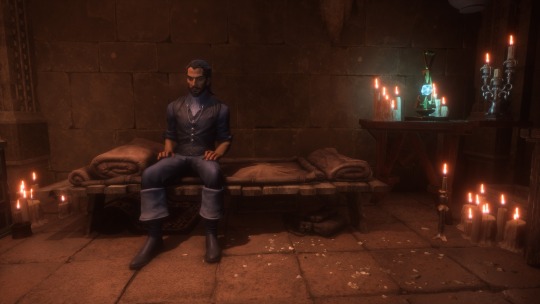
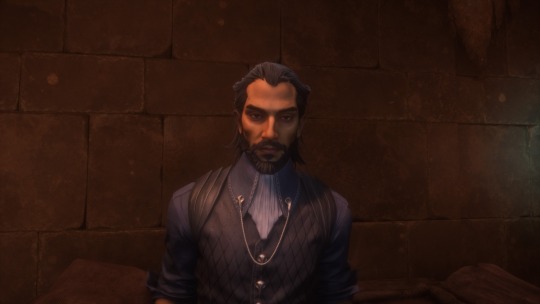
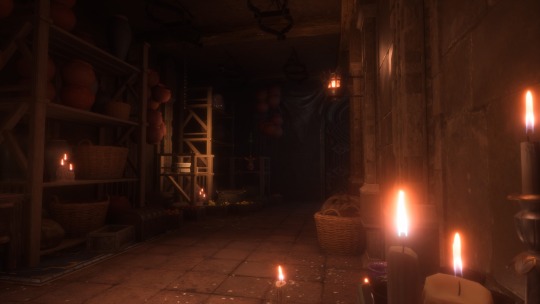
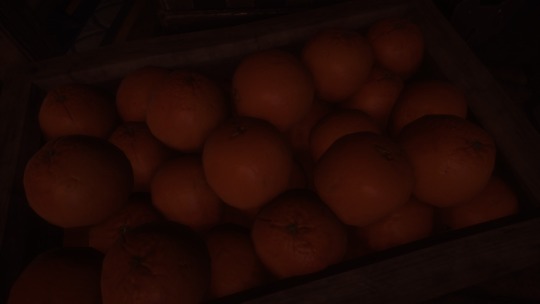
6. Emmrich
I hate to rank this one so low. Not only is Emmrich my romance of choice, but I'm a huge book lover in real life, and I love this aesthetic. But this man doesn't have anywhere to sleep! He's in his 50s and has nowhere to sleep! Much has been said about where he might be sleeping every night. Does he sleep on the corpse slab? Does he sleep in the big red chair? Does he curl up in front of the fire like a hound? If he was 19 maybe those options would be feasible. But I'm in my early thirties in real life, and the idea of spending a night on a hard floor/slab is already unbearable to imagine, and sitting upright all night is only done if I'm so ill I can't do otherwise. No bed is just unforgiveable. Also, he's stuck with the skull and spirit of his former friend/rival seemingly listening in on everything and critiquing him constantly. Imagine just minding your own business and having a skull call you "moldering" while implying you're too old to be with your partner of choice. On the other hand, I envy the shelf space, the spiral staircase, and the gorgeous balcony view.
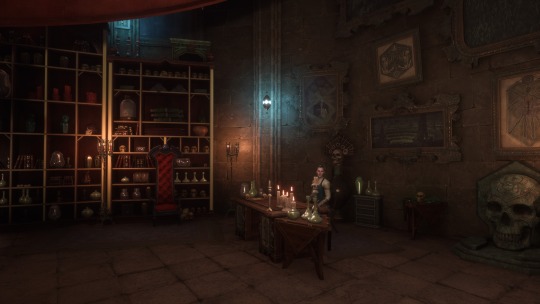
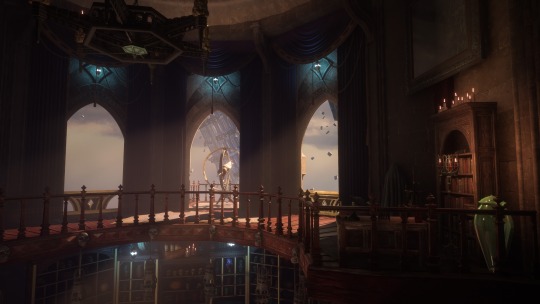
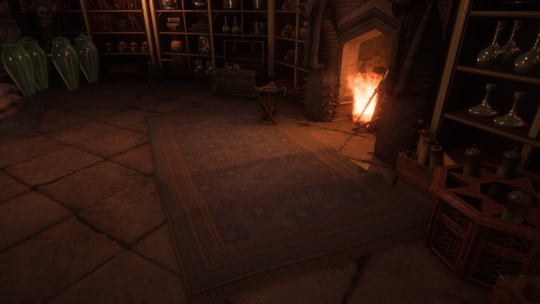
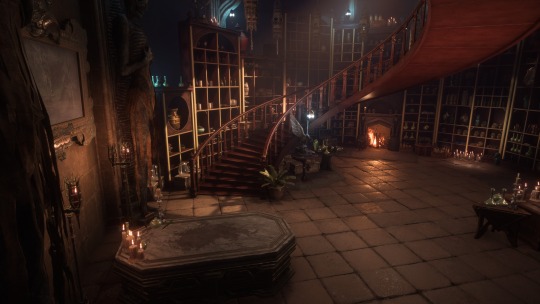
5. Taash
Maybe Taash likes having a gloomy room, I don't know. But sometimes this room looks like a straight up dungeon. Also, though there is some good functionality for training and such, the room lacks daily functionality due to the sheer amount of stuff everywhere. I get that Taash is a Lord of Fortune and treasure hunting is like their whole thing, but like, does Taash really need multiple huge stacks of silver bars and random sheaths of fabric here in their temporary Fade bedroom? What's the point of having so many tables if none of them have any more room to set things on when you actually need to? Some of these rugs are fantastic though. And Taash is one of only two companions with a real bed, so that counts for a lot.
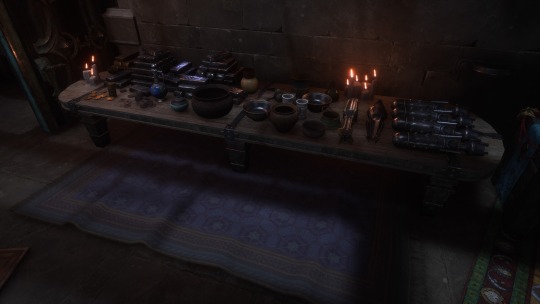
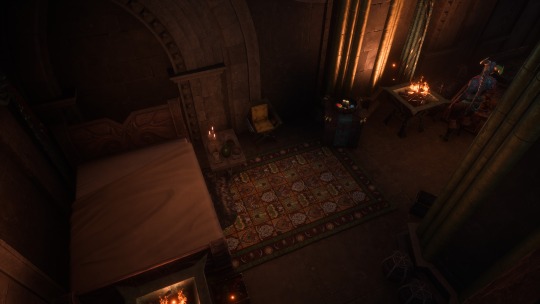
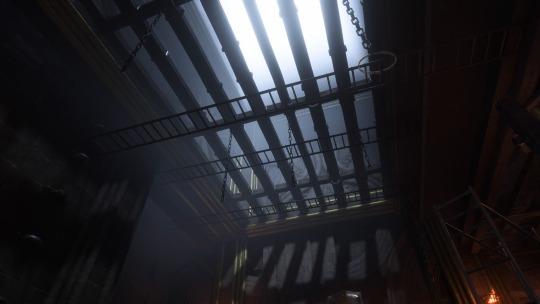
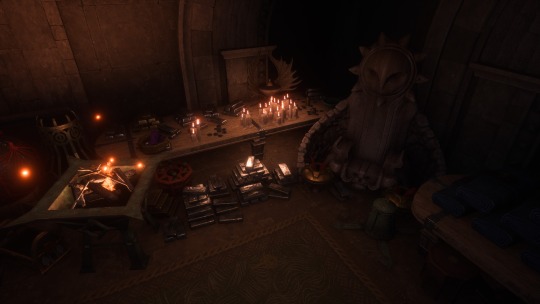
4. Bellara
This is more workshop than bedroom, which I guess suits Bellara well enough. But there's a couple of issues here. First, there's some pretty spiky tools a little close to her cot. God forbid she has a nightmare and jerks upright out of a deep sleep, she'd get slightly impaled. Also, imagine trying to sleep with the smug face of the Archive looking out at you all the time. And don't forget the room is just full to bursting with mirrors. That seems like a confusing, hazardous, headache inducing horror. There is some cool elven decor though.
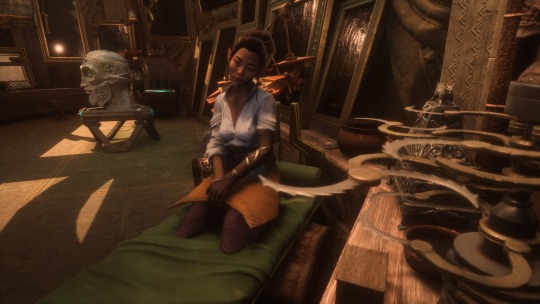
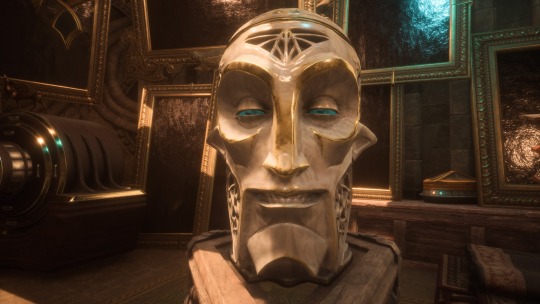
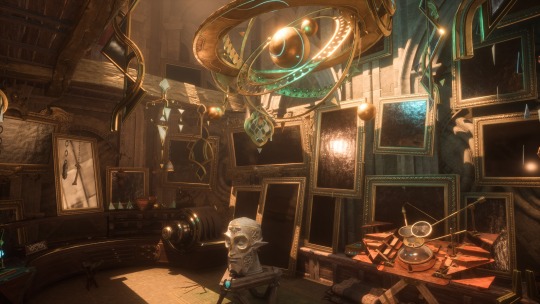
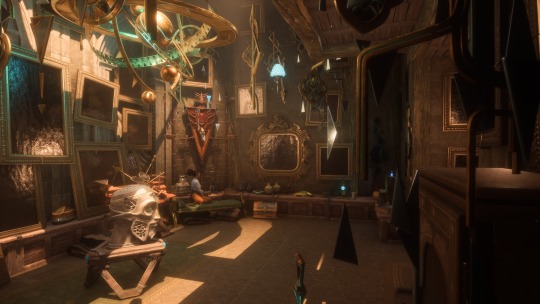
3. Neve
Neve has a pretty tiny space compared to some of the others, but I guess it's fitting for a noir style detective. She does have a bed, though it's only a less than stellar cot. She also has a bunch of wisps stealing her stuff all the time. But she has a beautiful view, more privacy than some of the others, and a nice desk, which is essential to a detective. And in the end this room is kind of gorgeous.
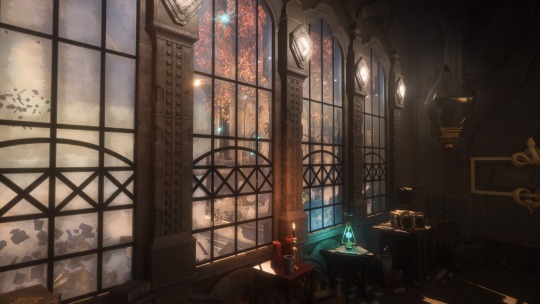
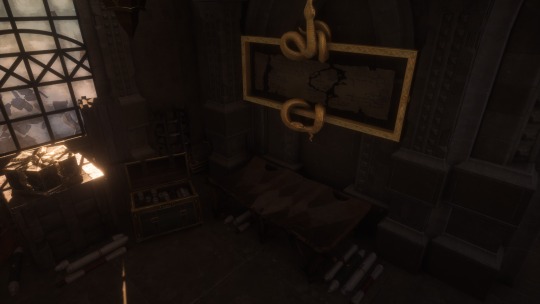
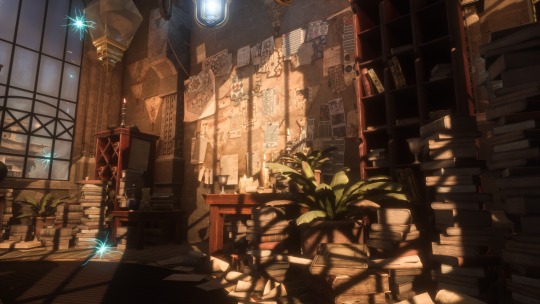
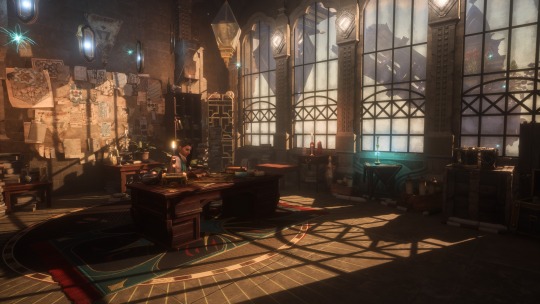
2. Harding
This whole place is fabulous. The plants are amazing. The magic butterflies are enchanting. The giant ceiling flower is beautiful. Harding doesn't have a real bed, but she has a canopy and a bedroll, which she's probably pretty comfortable in by now after 10+ years of being a scout. I also like that this room grows and transforms over the course of the story. Personally, I think this is the most aesthetically pleasing of the rooms, and I imagine there's some crickets in there to give you that peaceful summer evening soundtrack.
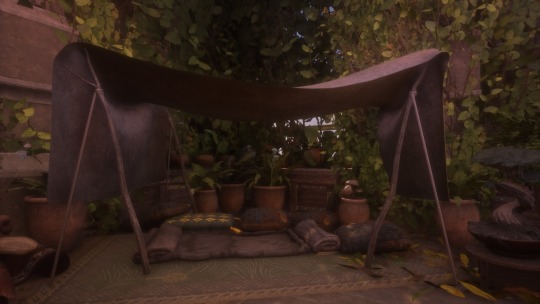
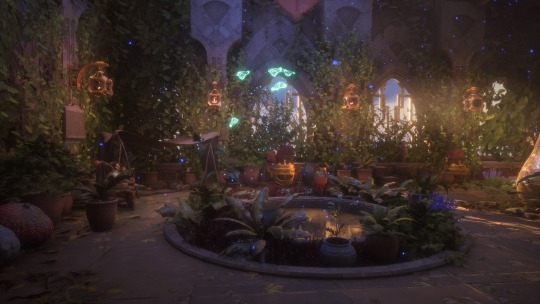
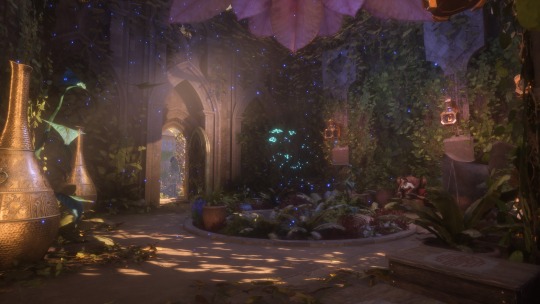
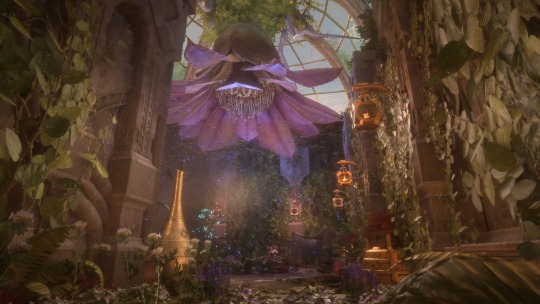
1.Davrin
Davrin's biggest advantage is the simple fact that he has a private sleeping area with a real bed. No one else has both of those things. On top of that, it's a functional space for he and Assan. It's open and has a nice perch for easy Assan access. It has shelf space for his carvings. He has lots of cool knick knacks. He has lots of natural light and a great view. But after looking more closely at his space I almost dropped him down a spot for one reason. NUGS. Did I miss a dialogue line about his love for nugs? Because there's A LOT of nug memorabilia in this place. There's a taxidermy nug with a face only Leliana could love. There's little nug carvings. There's bigger nug carvings. There's drawings of nug anatomy. I don't know if I'm more freaked out by the idea that Davrin brought them or the idea that Solas left them. Still, he does have a cozy fireplace/chair combo, as long as you don't mind being watched by the empty stares of a thousand lifeless nugs.
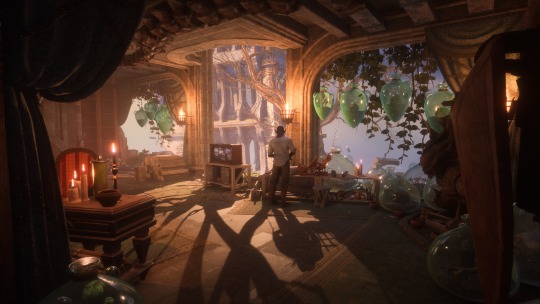
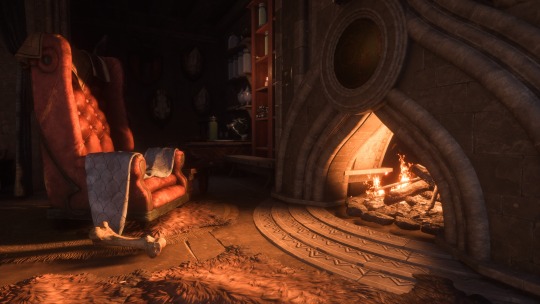
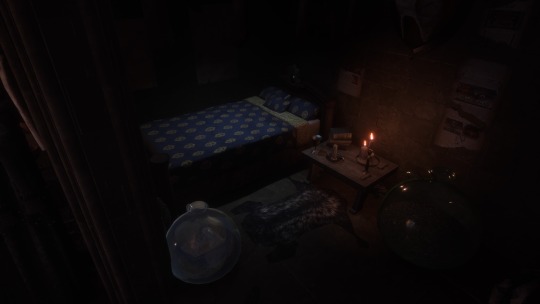
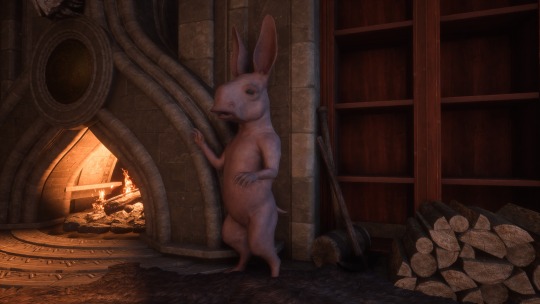
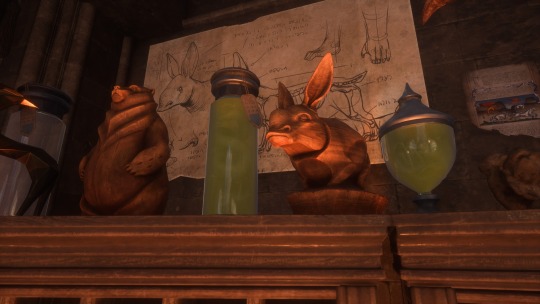
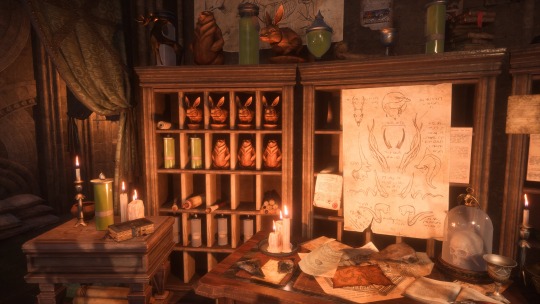
#dragon age#dragon age the veilguard#lucanis dellamorte#emmrich volkarin#emmrich x rook#taash#bellara lutare#neve gallus#lace harding#davrin#spoilers#dragon age the veilguard spoilers#video games#rpgs#bioware#why are there so many nugs?
92 notes
·
View notes
Note
🔥
Oooh, dealer's choice. Okay. Hmmm.
I think that MTMTE does not ever really manage to coherently bring together its ideas around things like functionism or the cold construct/forged idea, tbh. As ideas, it's very easy to latch onto in transformative fandom and try and do something with them- but on the flip side, I think that when you really try and just look at what the comic does with them in the text, they do not ever come together in a way that has a clear narrative goal, or is always well executed.
This feels weird to say when both concepts are incredibly necessary to the comic itself. They aren't superfluous elements you can take out and the comic is still what it is! Despite that, if you try and do a close read of the comic itself, it quickly feels apparent to me that a) in universe, diagetically, they are not very consistent and you often find yourself going 'wait, what?', and b) non-diagetically, in the realm of 'is this a stand in doing real world social commentary', it's straight up a mess much of the time. As worldbuilding, it's wishy-washy and inconsistent; as allegory or anything like it, you often wind up going 'hm. well. that doesn't really work'.
Is cold construction supposed to be a commentary on classism? Maybe- but the degree to which the text reinforces that a degree of real physical difference exists makes that touchy, frankly. Is it then using that to talk about class and disability as it relates to class? This would be an interesting angle- but the comic has too many issues around its treatment of the latter to invite uncritical use of that lens, in my opinion. Sometimes, racism gets invoked, but of that I can only say I think it is an ill-advised approach the comic does not explore well! Functionism, meanwhile, gestures at a lot of stuff, but never really convinces me the comic is quite sure what it's getting at there. Again, the question of classism comes to mind, and it's all clearly a response to the stuff set up early on in IDW1 by Megatron: Origin, which invites such commentary and critique. But there's just too many holes in its treatment of certain characters to make a lot of sense. The inconsistency means trying to do an actual read across the whole comic winds up maddening. (Source: I've tried.)
And if we justify this by saying 'not everything is allegory, sometimes worldbuilding is just worldbuilding'... well. It just still doesn't add up! In the moment, it seems to make sense, but attempting to extrapolate out into an actual consistent sense of how that world works, or worked pre-war, quickly falls apart for me. Which brings us back to the idea it's not literally consistent but is Doing Thematic Work, which... see above! We run into The Issues again!
This is not to say I think there's nothing interesting to be gained from engaging with this element, to be clear. But I find it's most productive for me when I engage with it from the baseline that it's a fairly muddled, inconsistent, and ultimately difficult to pin down element that, while very important to the comic, is not one of its narrative strengths. Very much a part of the comic where I think admitting the meat is in doing work as a reader to make it work for whatever reading you want to do is a good way to approach it, rather than assuming the comic itself has done that leg work. (And sometimes, that will mean being critical of it; I really do think there's stuff in there that deserves unpacking in how it's handled.)
74 notes
·
View notes
Note
I'd disagree with "No working class in any country has anything to get out of either side winning." when it comes to Russia ngl. The working class of Russia doesn't benefit if the US was able to militarily succeed or worse balkanize Russia. Also, the people on Donbas and Crimea have chosen to throw their weight behind Russia because of the oppression they were already facing from the Ukrainian state far before the special military operation began. Dogmatic internationalism like this is what leads to groups like cpusa being functionally useless to actually advance any critique outside of "both sides must defeat their bourgeoisie" which in practice just becomes anarchism or at worse wrt to Palestine fully opposing national liberation struggles or refusing to take sides w/ Venezuela's oppositional communist party. Hopefully this comes off well, because it's meant as an earnest discussion. Highly recc the interview Rania Khalek did with one of the leaders of the Russian Communist Party on this topic.
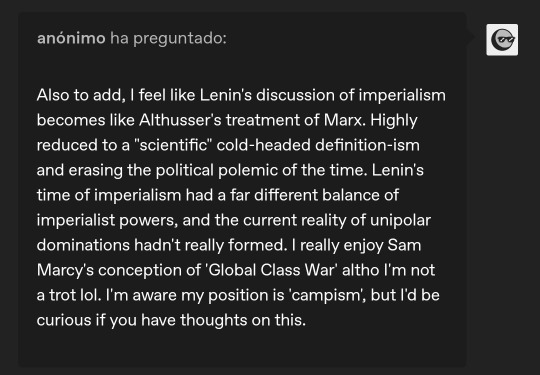
context
Yes, the working class in Russia will suffer much more were the US to break Russia up (which a victory in Ukraine does not entail but that's beyond the point). Does that mean NATO's working class will benefit from it? or that Russia's proletariat will benefit from their victory? You're right, you're not thinking like a communist, you're thinking like a campist unable to see the interests of the working class in the entire world lies not with this or that dictatorship of the bourgeoisie but with their own self-government free of exploitation. Are we supposed to be tailists here? Are we actually meant to uncritically follow what x section of a working class ""chooses"" in an inter-imperialist context? Yes, Russians in Crimea and Donbass prefer to be under Russia, as do the Estonian people largely prefer to put their weight behind the fascist worshipping Estonian government. There is a difference between focusing on the criticism and struggle against our own bourgeoisies, and simply calling for the other side to win. You're making the exact same assumption the propagandists of NATO make when they label internationalists as Russian chauvinists, they distort revolutionary defeatism into "psyops" by the other side, and you're actually holding that position. Communism is not about taking the majority position of an arbitrary section of the working class because it just so happens to not be what our own bourgeoisie says. It's a revolutionary position, able to identify the revolutionary intuitions in the working class and push it to its farthest extremes through the framework of communism. You're following the exact same logic the patsoc groups follow when they decide to be the most transphobic and racist, because big swaths of the working class are transphobic and racist.
In what world is the defense of the interests of the working class in opposition to this or that bourgeois alternatives functionally anarchist? are you under the impression that working for a dictatorship of the proletariat is anarchism because we oppose bourgeois states? This is vulgar to an extreme degree. "Dogmatic internationalism", what a phrase. Is it dogmatic internationalism when the KKE blocks an arms shipment to Ukraine? is it anarchic when communists in Europe and the US aren't contrarian for opposition's sake and actually develop a position independent of this or that dictatorship of the bourgeoisie? Get real. What fantastical leap of logic to assume this automatically leads to holding left communist position regarding national liberation movements, if anything it's the constant confusion opportunists create around Russia's capitalist interests that leads people to assume it's comparable to the Palestinian genocide. You're arguing against a mirror.
I partly agree with you wrt to Lenin's imperialism, it is an unfinished definition. But "unipolarism" is not even close to an actually materialist approach. Are the contradictions between different capitalist factions suddenly fundamentally different because there isn't a "balance"? How exactly does this make the "underdog" capitalist share common interests with the working class he exploits and sends to a meat grinder? Do we support small businesses too because they have certain opposing interests to the Amazon and Google monopolies?
41 notes
·
View notes
Note
Do you have any thoughts on how RWBY handled the white fang storyline?
Unpopular opinion: it's decent?
Now, now, before people come at me with pitchforks: yes, it's overly simplified. The entire story is a fairy tale, though, so that's not out of place. It also complements the rest of the story thematically, and manages to incorporate nuance and complexity in despite the simplification of issues.
I think it's a mistake to look at the White Fang as a 1=1 of the real life struggles of marginalized groups. That said, there obviously are parallels, and so people aren't mistaken to note those. I just think it's not meant to be an instructional manual and shouldn't necessarily be viewed as one, but rather a conversation starter in some ways. And yes, those conversations can and should include critiques.
So I'll go over the points that I think it did well and how those ties into real life, but also specifically how they work for RWBY's overall story. This does not negate criticisms, especially those by marginalized groups.
In contrast to some other fictional depictions, RWBY actually is better as well because it avoids the number one pitfall of such issues: the X-Men fallacy. I've talked about this in terms of Attack on Titan before, but essentially it's the idea that the problem with depicting discrimination against superpowered people is that, well, there is a logical reason for people to be concerned about superpowers; hence, it almost justifies that very discrimination it seeks to condemn. This isn't present in the faunus/human divide. They are both capable of superpowers.
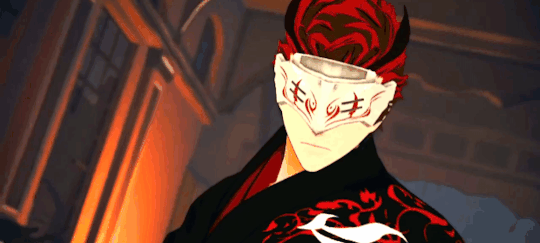
It also doesn't fall into another common pitfall: the idea that people have to be perfect to be victims of discrimination. The White Fang... has senselessly and cruelly murdered people; doesn't mean faunus discrimination isn't also cruel and senseless and doesn't justify it. And this is something that we do see in real life too--people trying to either completely whitewash the actions of radical anti-oppression movements, which can do awful things, or trying to use these awful things as evidence that these people deserve discrimination when really it's a result of rage and desperation at a society that refuses to give them anything. That doesn't justify the pain of the victims of the awful things (see, Weiss) but nor does it negate the righteousness of that anger.
It does portray the faunus as a fairly diverse group too, when fiction often portrays marginalized groups as a monolith. That's not true. People from one group have very different ideas about what liberation looks like, and what they want to achieve. People in marginalized groups are people, and they can be motivated by a variety of selfless principles and egotistical validation, and neither negate the other. See, Sienna vs. Ghira vs. Adam.
Now, of course within RWBY Ghira's more nonviolent principles more or less win out. That's because RWBY is again a fairy tale where you have to fight to live, but that also doesn't endorse violence. If you expected otherwise, wrong genre. Of course the real world is far more complex, but it's not as if there is no real world basis for this either. Peacemakers exist, and nonviolence has accomplished a lot before. Whether or not that's the be-all-end-all of the faunus struggle in RWBY isn't even clear, so I don't think it's intended to be the be-all-end-all preached moral as it applies to the real world either.
Story-wise, the White Fang functions as a Jungian shadow of society. If you do not take charge of your own life, you are letting others decide for you. The faunus who disagree with the White Fang take it back, because they have to acknowledge it to move forward in society. They have to integrate with it, and accept their own humanity: capable of good and what they might rather deny.

This faction--the faunus who don't like the White Fang--are represented in Ghira, who becomes passive and steps back from aspects of the movement. However, when Blake arrives in Menagerie, this changes, because Blake's entire arc is about integration. Ghira then becomes active, working for the rights of the faunus and for the White Fang to be better rather than simply disavowing the White Fang in an attempt to be a good person, because doing nothing isn't exactly good.
On a more character level, the White Fang exists for Blake's arc. Her Jungian archetype is the Shadow. Like, it's literally her semblance's name. Hence, the idea of the shadow is gonna be important. If you want more on this, @aspoonofsugar has written a meta on it here and another here.
So, for Blake, on a personal level the White Fang (especially under Adam) represents the parts of herself she doesn't like. The part that ran from her family. The part that is violent. And yet, she cannot abandon it or simply disavow it. No, the answer is instead:
We’re not going to destroy the White Fang. We’re going to take it back.
She has to integrate with it, take the good--the righteous anger, the focus on justice and equality.
The White Fang also comments on the microcosm/macrocosm of alchemy.

For the unaware, RWBY is an alchemical story, and the principles of alchemy are represented in the symbol for the philosopher's stone, as seen above. Microcosm: the smaller circle enclosing two people in the center who come together (hence chemical weddings). The square is the four elements: water, earth, fire, air. The triangle is body, heart, and mind. The larger circle is the macrocosm.
The Shadows for Blake on a personal level--microcosm--is Adam. The Shadow on a worldwide, big picture scale--the macrocosm--is the White Fang. Integrating with the shadow isn't only an individualistic endeavor, but also one that benefits society as a whole and brings life to the entire world. The main point of alchemy's philosopher's stone, which Blake, along with the rest of RWBY, are symbolically being transformed into.
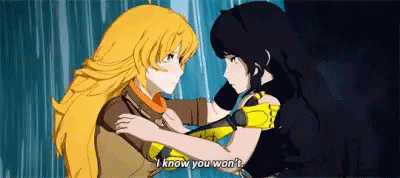
I think the main issue with the White Fang, by the way, is its handling of Adam. Typically you don't kill the shadow, though I do think Blake kinda had no choice. Still, I don't think the show fully explored him.
Yet what does work with what we have is that Yang has to face Adam, Blake's shadow, to be with Blake. Yang losing her arm to Adam parallels her being upset about losing Blake to fear, because symbolically Blake can hurt her deeply in the way only a lover can. Blake has to stop running from her shadow and allow herself ot be known and seen by Yang to be with her.
#ask hamliet#rwby#rwby meta#blake belladonna#yang xiao long#white fang#adam taurus#bumbleby#sienna khan#ghira belladonna
224 notes
·
View notes
Text
There's some back and forth about that post about how men are unwelcome in leftist spaces and I've reblogged from both sides cause both sides are right. The world is big and diverse and I've seen it both ways.
I've certainly seen spaces that have too much bioessentialist "yes all men" rhetoric, it is stupid. It gets nowhere and just indulges the worst impulses of enforcing binaries and fear based policy discussion. Like, damn people we're not different species we're not actually that different at all.
At the same time these spaces that have developed this attitude did so in response to interlopers who would enter the conversation, not interested in how they can help the movement but how the movement can help them. Feminists can't solve male incarceration just like the audubon society can't solve net neutrality. Sorry, good luck with your thing, genuinely.
I've also seen a rebuttal that said that the right doesn't actually value men, so men shouldn't be drawn to it. Well, their messaging says they do and they make a show of it so functionally they do.
This is just like the situation of the left and ex-muslims. Either pick the left where, in many public facing spaces, critiquing islamic countries for basic things like assaulting women for not covering up right is hushed as islamophobia (tbh I've seen a lot less of that recently. A lot of open support for that college student recently and open discussion), or pick the right where critiquing islam is welcome. Even when "critique" goes well past the point of discussing cultural practices that need to stop all the way to condemning people to die for being savages (fuckin asmongold.)
If people tell men they are immutably bad, nothing to be done, then the men will do nothing and move on. That being said if there are no spaces on the left that serve the needs of men, trying to co-opt existing spaces will just result in hostility. People can make new spaces, we can welcome that. WhiteDudesForHarris, I think it was? Seemed productive.
40 notes
·
View notes
Text
i think the reasons that davg is such a contentious game boil down to a couple primary things:
unexamined bigotry. i don't even mean this harshly, but We Live In A Society and davg is an Unusual game in many ways. very female-led, for one. and that sense of unfamiliarity and potentially even discomfort can easily be translated into "this game is bad, actually" - but it's very queer, it's very diverse, it's neurodivergent, it's multicultural, it's nuanced and complex
typical fantasy videogame standards not being met. this, to me, especially applies wrt critiques of rook being "too nice" or the companions getting along too well or whatever. we're accustomed - including from other da games - to certain typical features, the absence of which can produce feelings of discomfort which, again, can be translated into "this game is bad, actually"
10 year period of building a game in our heads and in the collective fandom. this one is notably not a failure of the actual game that has been delivered, but it's easy to understand the disappointment and discontent/discomfort with this. not criticizing anyone who feels this way, it's very understandable, but it's just... it doesn't mean the game is empirically bad, it means it's not what you/we (as the fandom) expected
people rushing through. if you play this game fast, if you miss a lot of the companion banter, if you aren't checking in on ppl in the lighthouse, if you're ignoring all the idle npc conversations, then, yes, i could see it feeling a lot flatter. the function of learning about your companions is also very different from prior games, and if that system doesn't work for you or you aren't engaging with it, then i can see how the companions would also feel flatter
and to be clear, i'm not bashing anyone who falls into any of these things, or hates it/thinks it's a bad game for other reasons. i'm sorry it didn't live up to your expectations or that you otherwise can't connect with it
i just don't think that one person hating it means other people are wrong for loving it, y'know? and i'm sure there are shitty people on both sides, lovers and haters, but ime i've noticed haters being shittier and it's tiring
so, to the haters who are polite: thank you! love you!
to the lovers who are shitty: stop that! no, seriously!
but this is my read on the overall situation
#veilguard positive#fandom critical#not like excessively fandom critical i don't think but enough for the tag certainly#da4#davg
22 notes
·
View notes
Text
I've let my thoughts marinate for a while after finishing up Dragon Age Veilguard. In the spirit of contributing to a fandom that I love, I'm going to be shouting my general thoughts about the game into the void instead of having the decency to keep them in my head.
TLDR: it's complicated. Better than expected, but still pretty flawed.
Things I liked:
I was initially pretty meh on the toonier direction they took the character art in. It felt like ... knock-off overwatch. However the style really grew on me as I played the game and I found that the character models were really expressive in a fun way.
The environment design was really colorful and fun! One of my biggest critiques of DA:O was how ... brown and ugly the game was. While I think it was probably the right artistic choice to remove the hilariously over the top post-combat blood splatter effects, I do miss it. This game had some really interesting visual design.
Watching Solas's worst memories like episodes of Real Housewives with the crew.
The combat was also more fun than expected. I definitely prefer tactical combat in games, and don't generally enjoy action games, but I had fun with it and felt like it struck (for me) the right balance between difficulty and frustration.
There were some really interesting and subtle things in some of the writing (especially when combined with character expressions). There were little characterization details that I thought were really well done (for example: the fact that Lucanis was obviously the most rattled at weisshaupt) . The prison of regret was a high point in the series.
I really liked a lot of the big lore reveals.
It was fun seeing some of the environments that we've only heard about. in the previous games.
I actually really enjoyed how direct Taash's gender adventure was. There was no room for "well actually, they aren't non-binary, they are this unique fantasy term that isn't actually queer". I also enjoyed how it acted as a vehicle for the other gnc characters in the story to have their moments. Bonus points for also having non-binary characters doing something other than gender with their lives.
The game was functional, complete and ran well on launch! I had to put down BG3 for like two months because it was unplayably buggy when I picked it up, and the ending of DA:I really doesn't have any impact without Tresspasser, which came out much later.
Things I didn't like:
The writing was very uneven and pretty awkward at times. The number of times the phrases "Gods, Rituals and Artifacts" were uttered by different characters, often without any further explanation, really made me itchy. It was really weird to me why the characters kept calling the Evanuris Gods (especially with a non-elven Rook). I also wanted to grab Neve by the shoulders and shake her whenever she talked about the venatori doing a ritual. WHAT KIND OF RITUAL? GIVE ME SOME JUICY LORE TIDBITS BEFORE I CHEW MY ARM OFF.
The venatori and the antaam were straight out of Saturday cartoon villains. Their motivation also made absolutely no sense from a world-building point of view (maybe if they leaned more into the fact that the elven gods were also the Tevinter old gods ...?). This whole conflict really felt ... underbaked.
I can respect the game design choice to want the player to be completely heroic, and frankly -- given that most people don't pick the "evil" path, it makes sense to devote more effort in creating permutations of the good path ... but I do feel like they really could have pushed the themes of "as a leader, sometimes you won't have any good choices" a little bit harder (idk -- I think it would have been interesting if instead of the blight dragon, you would have to chose whether or not you'd ally yourself with the venatori and leave Treviso to the Antaam or vice versa).
DA:I does a good job convincing me that Inky is creating complicated alliances between different powerful factions. DA:V falls flat in this regard. I think they were aiming for the different factions to feel small and scrappy, but with the exception of the Shadow Dragons (and maybe the Lords) ... the Wardens, the Mourn Watch, and the Crows are major political forces ... which feel weirdly small.
All of the companions were pretty ... unobjectionable and straightforward heroes. As someone who personally loved the dynamic between Anders and Fenris in DA:2, I was pretty disappointed by the lack of inter-party conflict. Serious cultural conflicts between characters such as Emmrich and Tassh were resolved .... without much fuss. I didn't feel like any of the conversations about the fact that Lucanis kills people for money had any teeth.
In that vein, I felt like the worldbuilding was also pretty defanged. Topics of racism and religious oppression were very prominent in earlier games. I think it's pretty obvious why having an oppressed racial minorities gods being the main villain would be a bad look. Heck, I can also understand and respect these themes being less fun for the writers to explore in the hellhole that is 2025, but I think this could have been handled in a more elegant way. Instead it felt weird and hand-wavy.
The crows really must've hired a PR team after that whole incident with Zev. My headcanons really had to do some heavy lifting.
We finally get to see Minrathous, the biggest magical city in Thedas ... and the area we explore is just a generic fantasy fishing town? We see the cool floating canons in the intro sequence! Give us more of those.
The game was inconsistent about incorporating bits of Rook's origins into the dialog. For example, the seer in Rivain explaining their relationship with spirits felt really weird with a Lord of Fortune Rook. Another (minor) example, Mourn Watch Rook eats the fish, it would have been neat to have the option for him to be vegetarian (given that this is common in Nevarra).
Romance is my favorite part of dragon age, and I felt like all of the romances were very ... paint by numbers.
Dreadwolf would have been a much better name.
Some of the comments from people involved in the game (specifically the AMA -- but also the whole "this is the most romantic dragon age game ever") had a weird vibe.
Where are Solas's agents? What happened to them?!
We were not betrayed by any of our apostate companions, 0/10 this is an important aspect of any dragon age game.
Rook felt like the boss that nobody wanted to invite to do anything fun. The companions seemed like they had a lot of dynamic with each other, but they never really directly spoke with Rook. It was weird how you couldn't talk to them. You had to awkwardly listen in on their conversations. Pretty much all of the companions have more chemistry with each other than Rook.
I have more thoughts about specific characters and plot points that I may share later, but I needed to expunge this from my mind like an exorcism.
32 notes
·
View notes